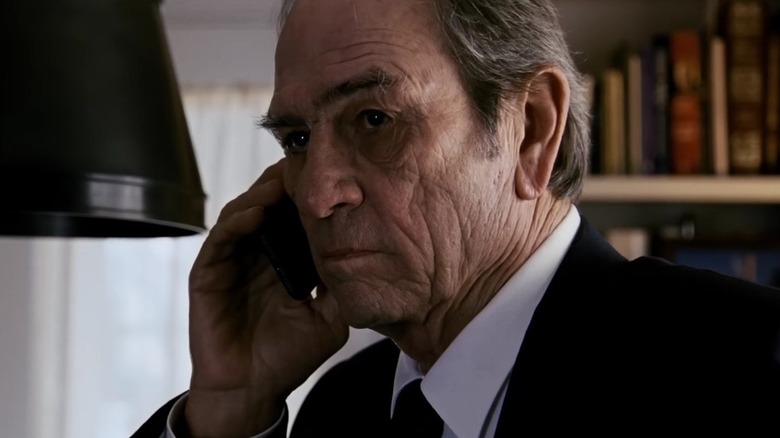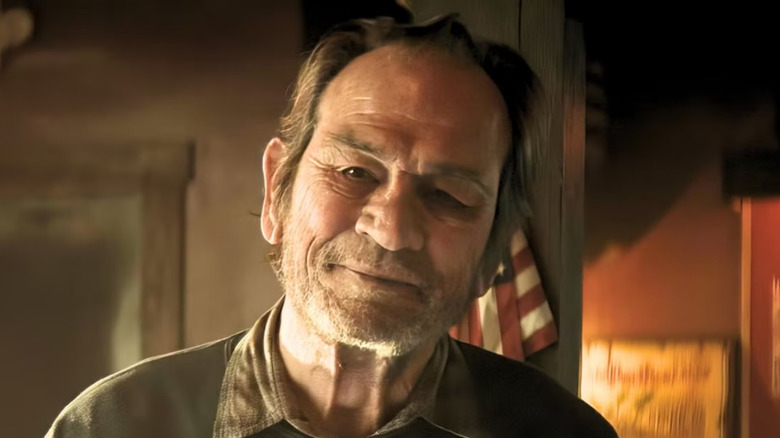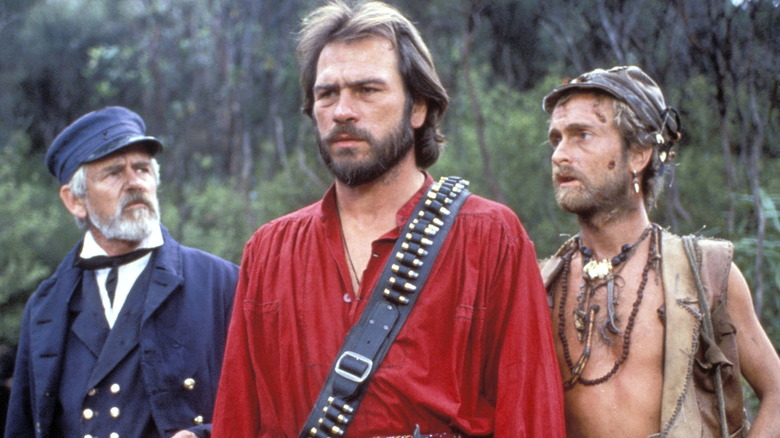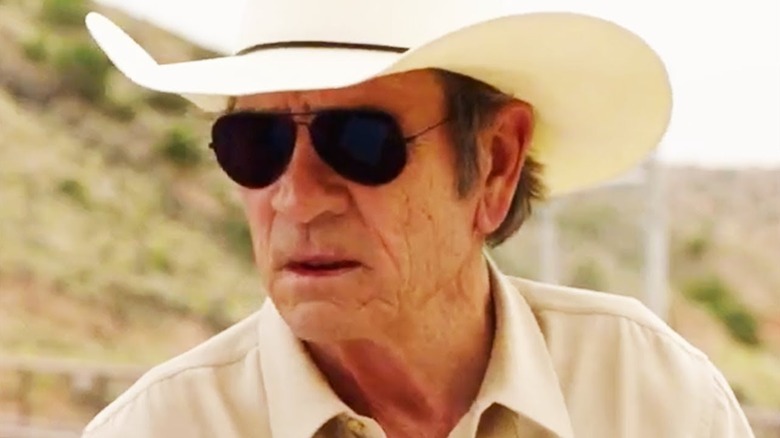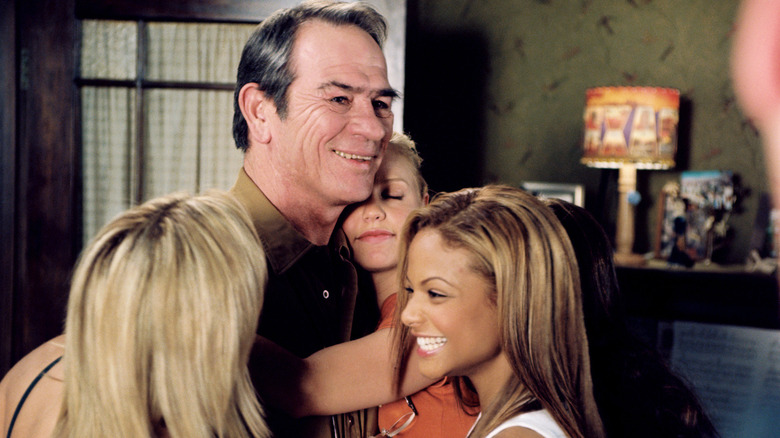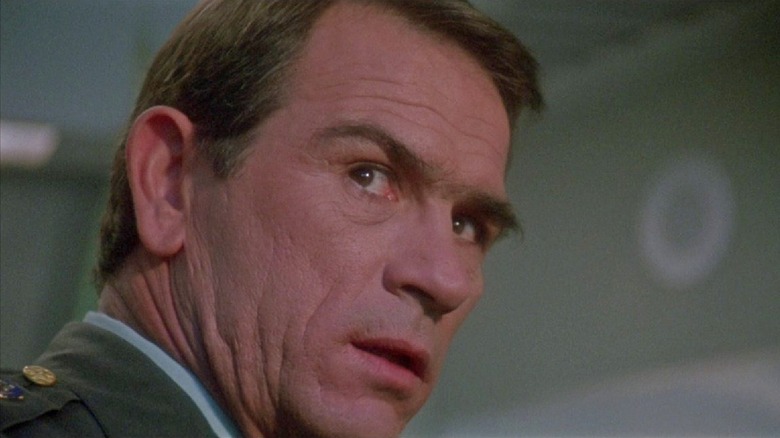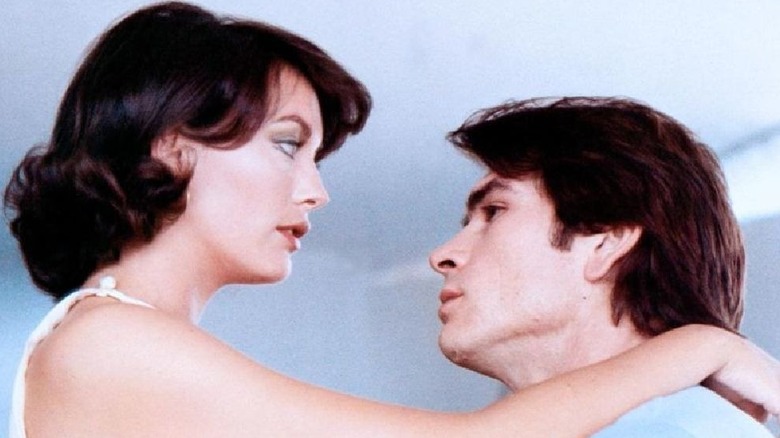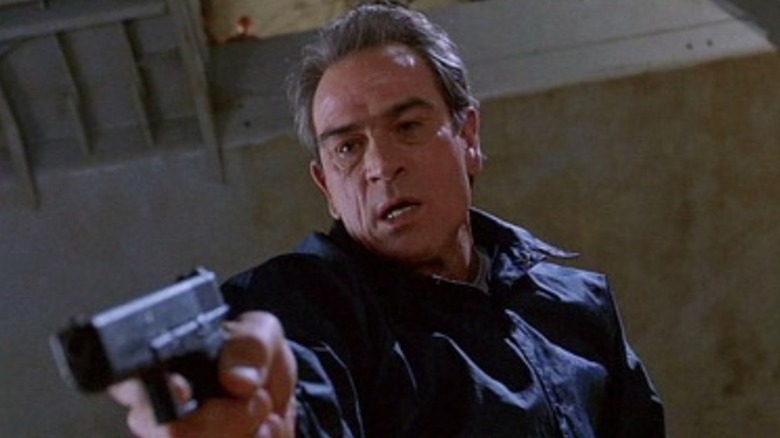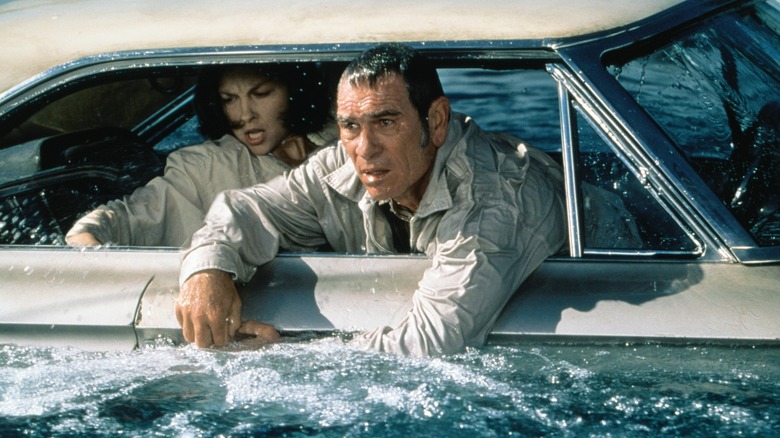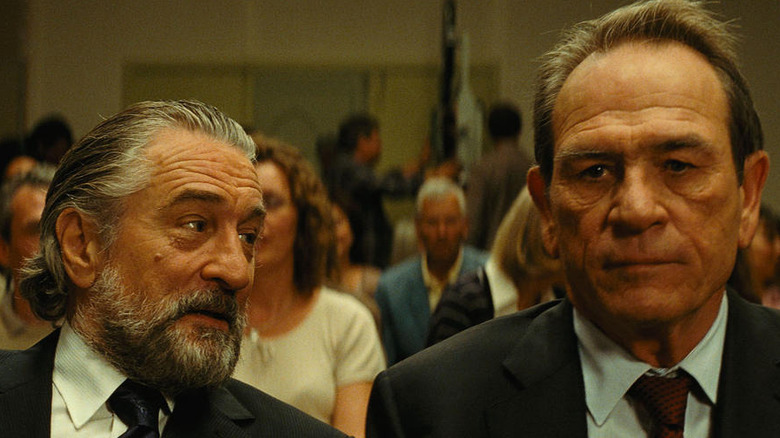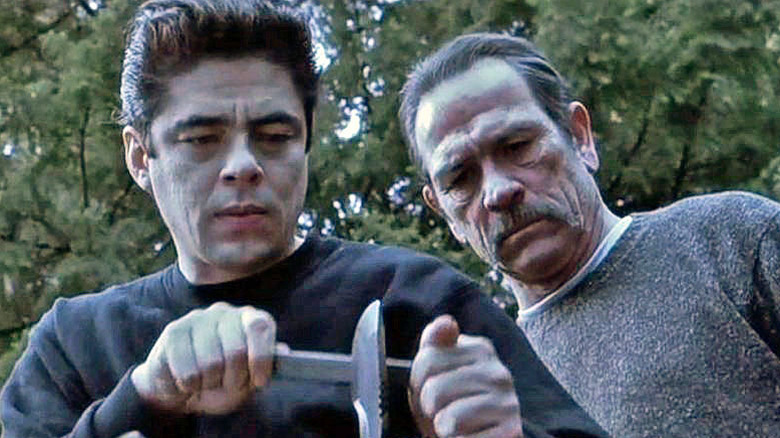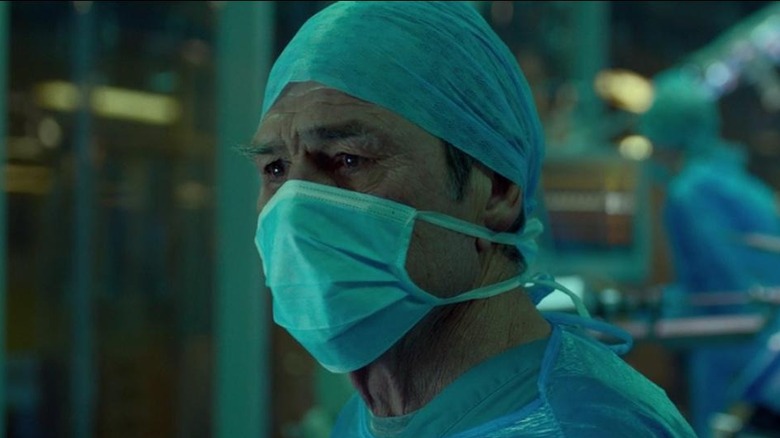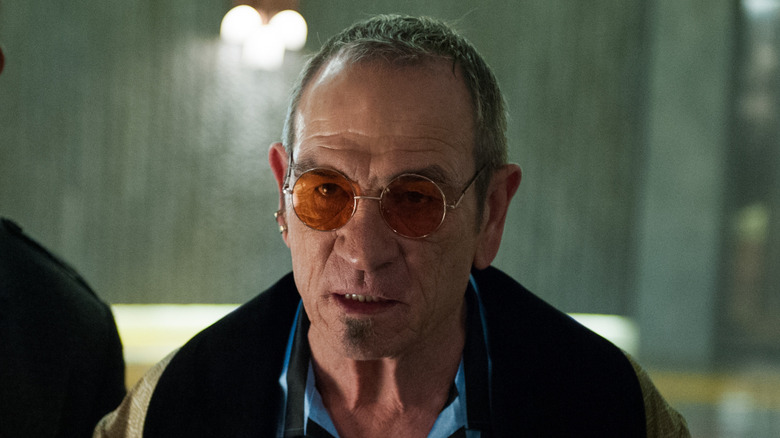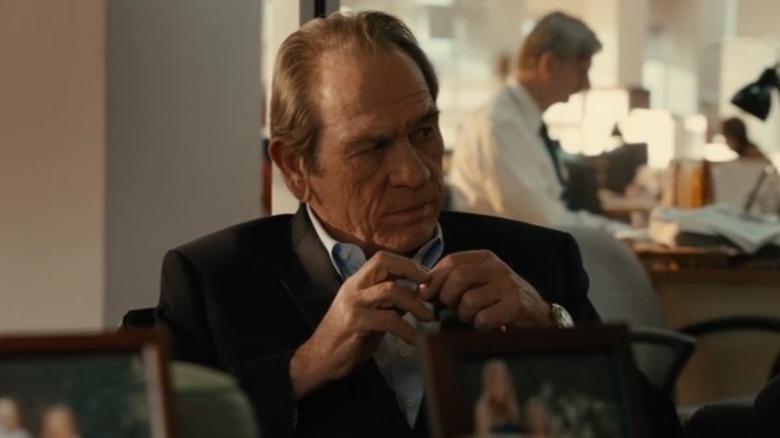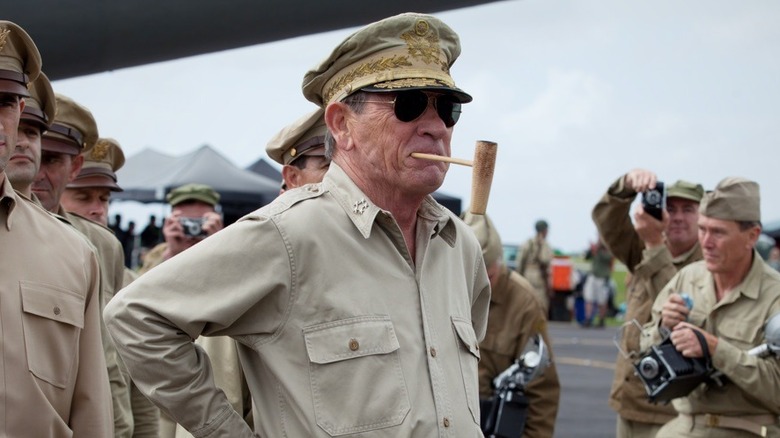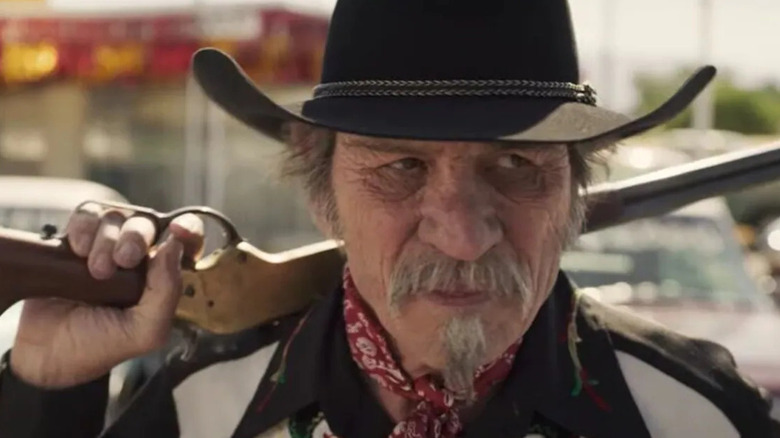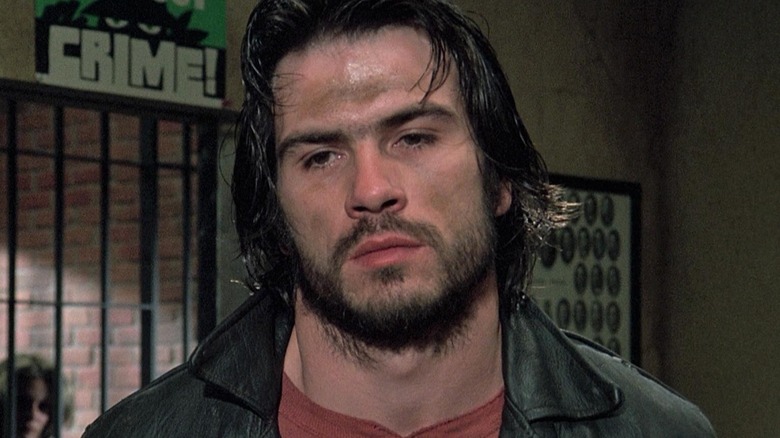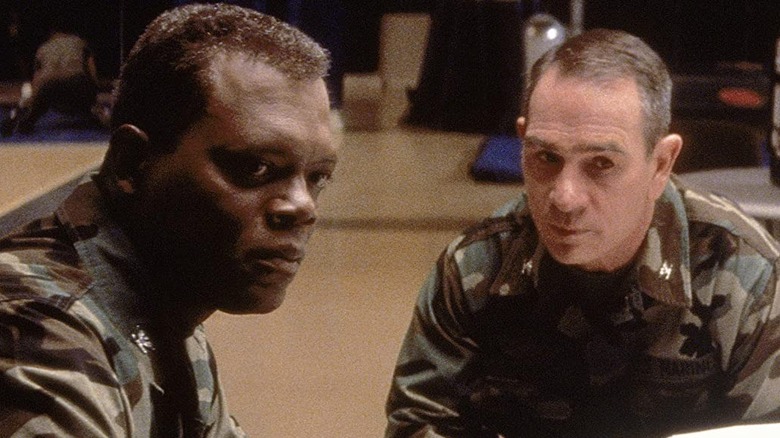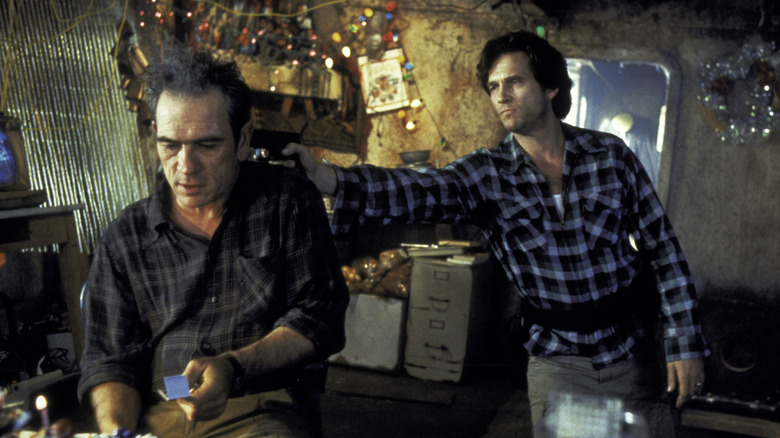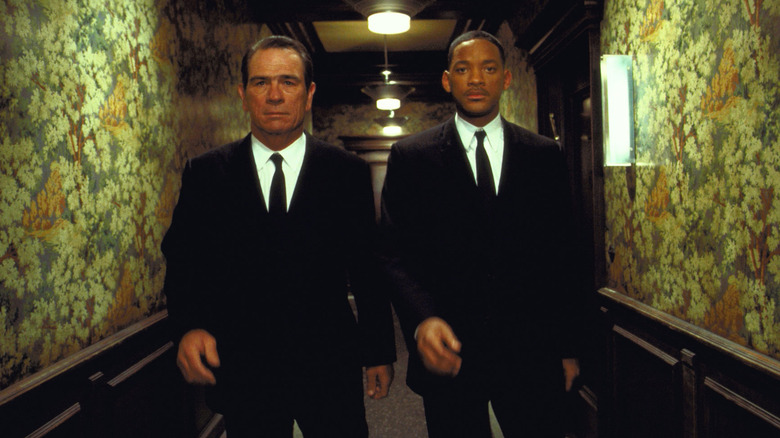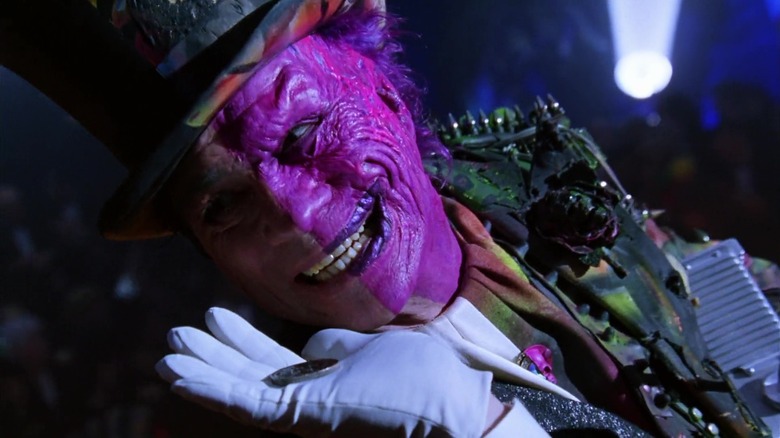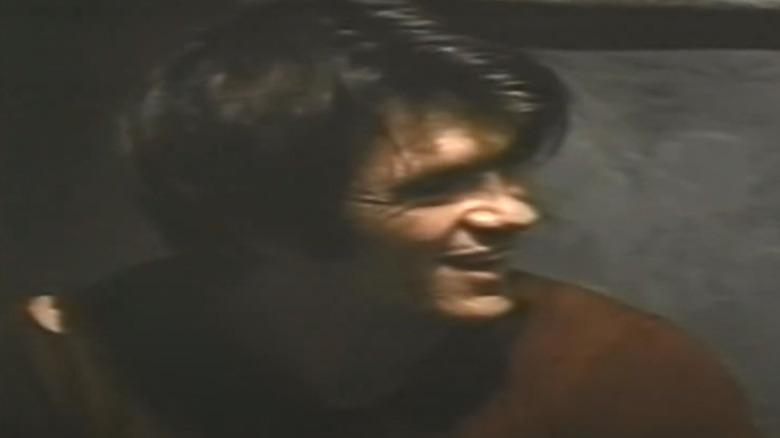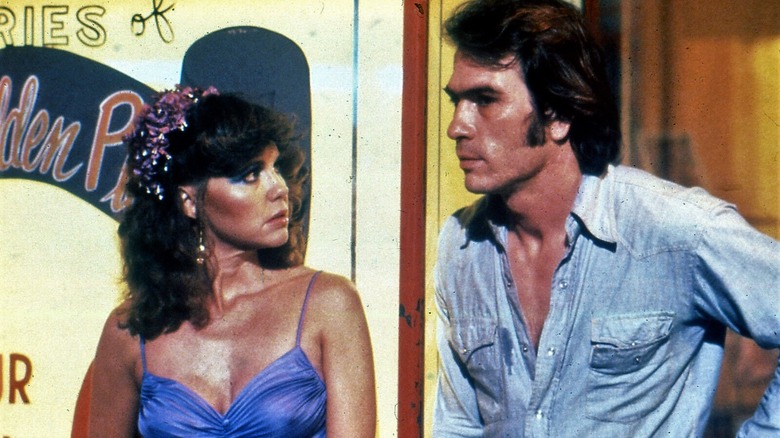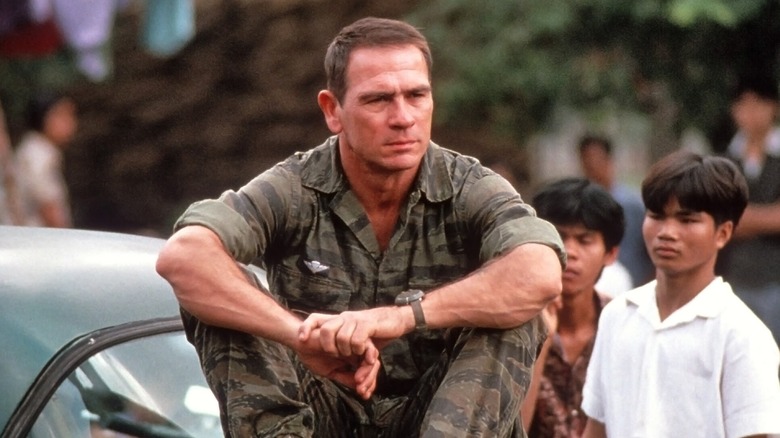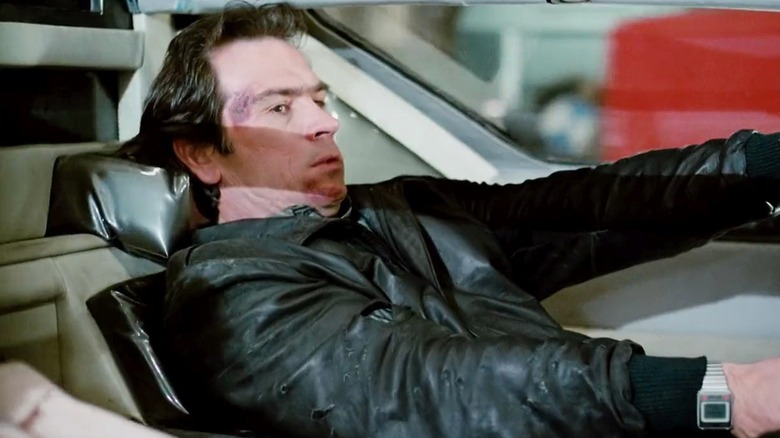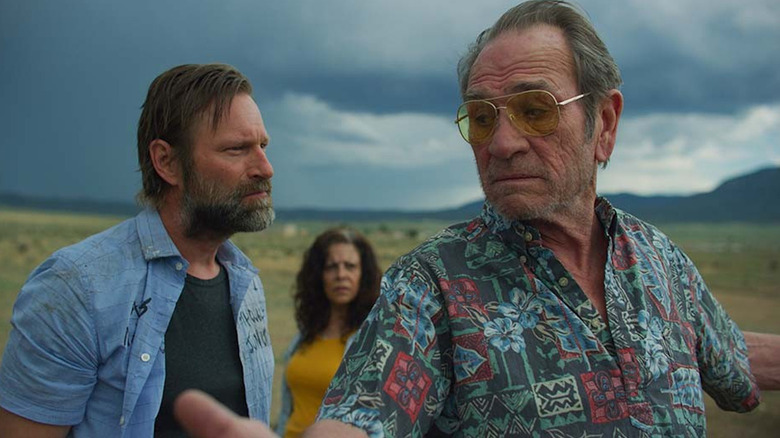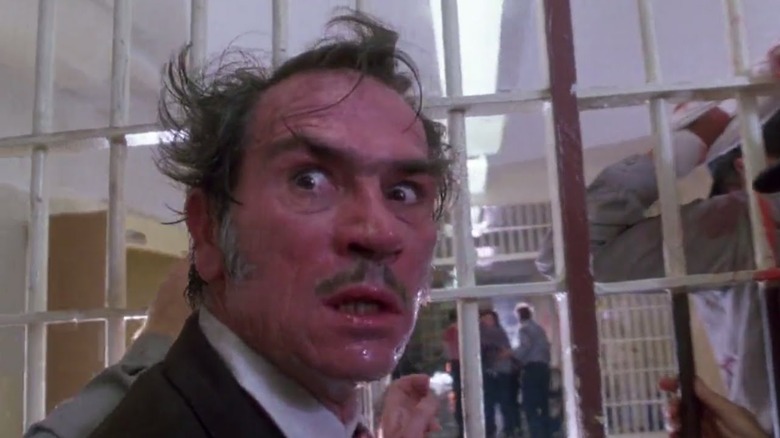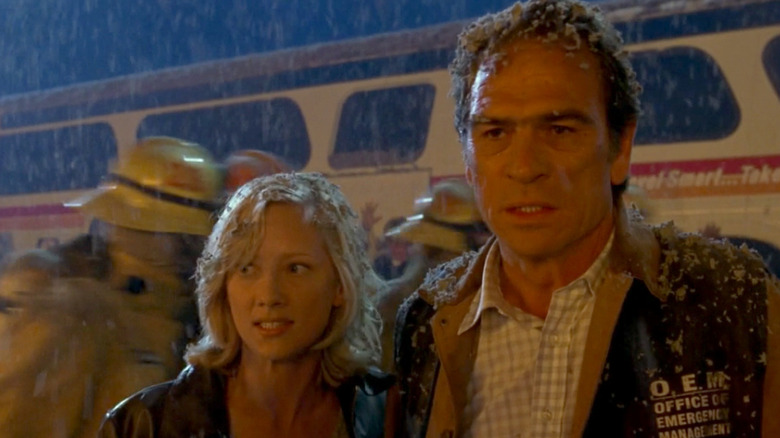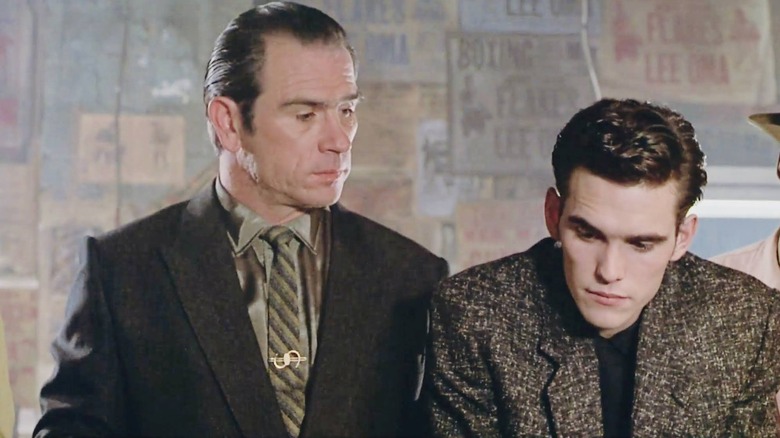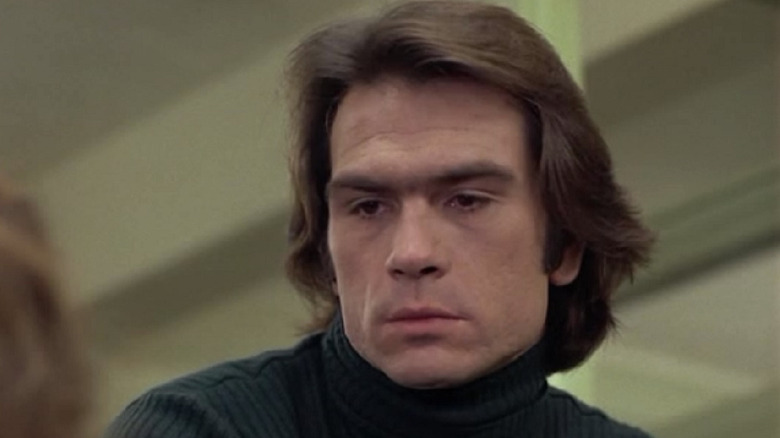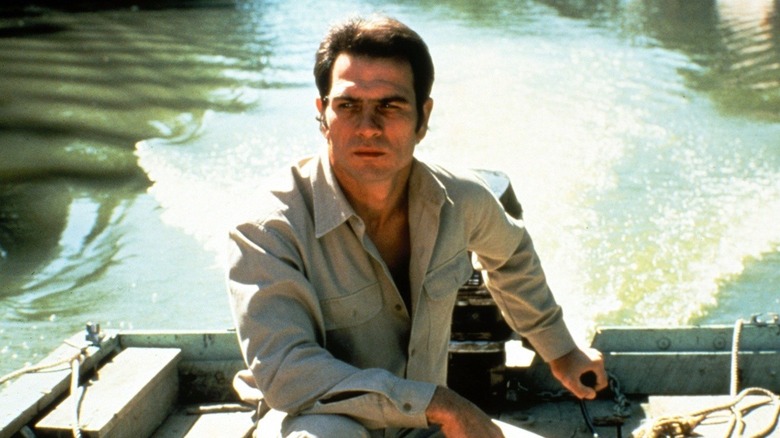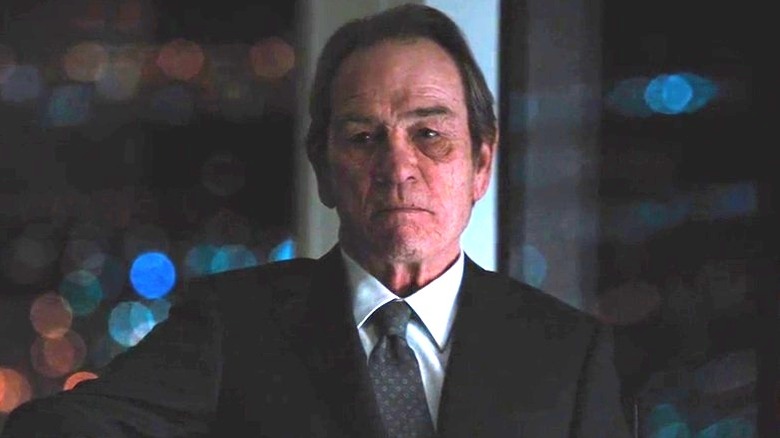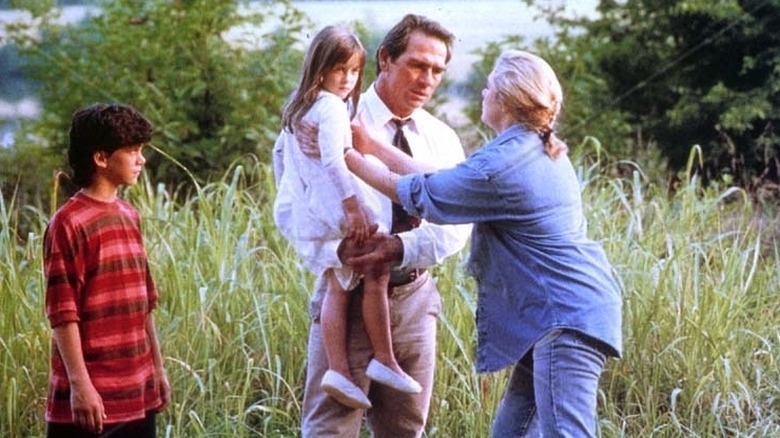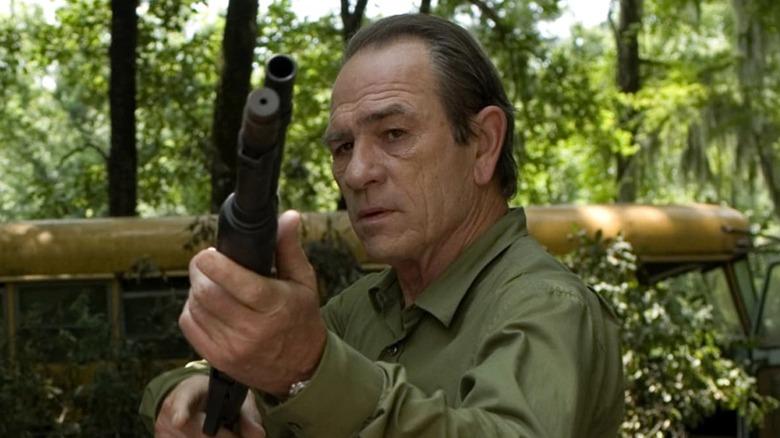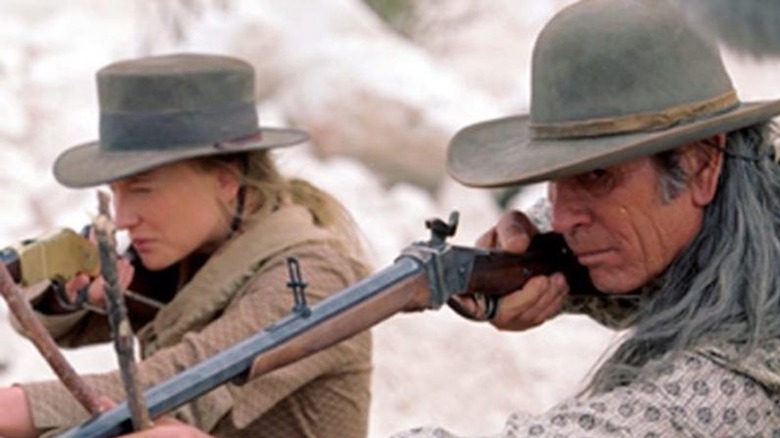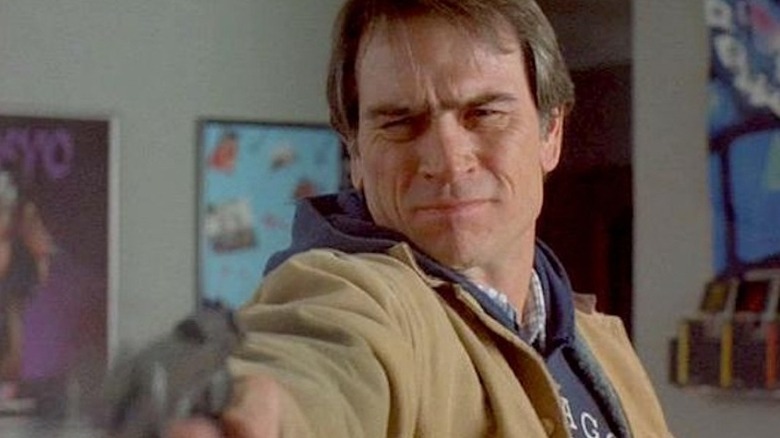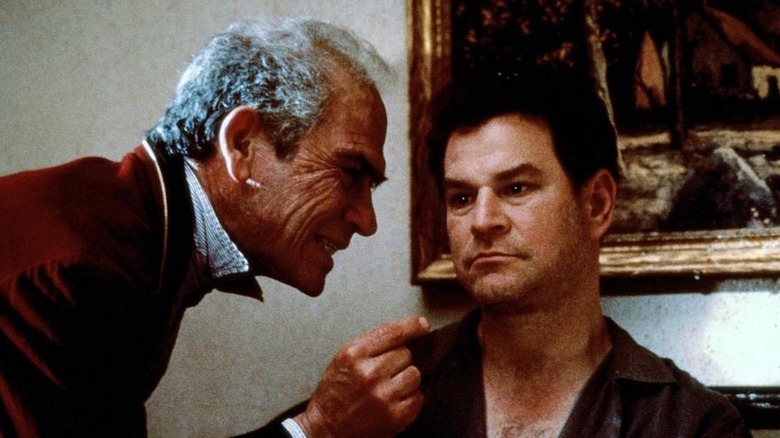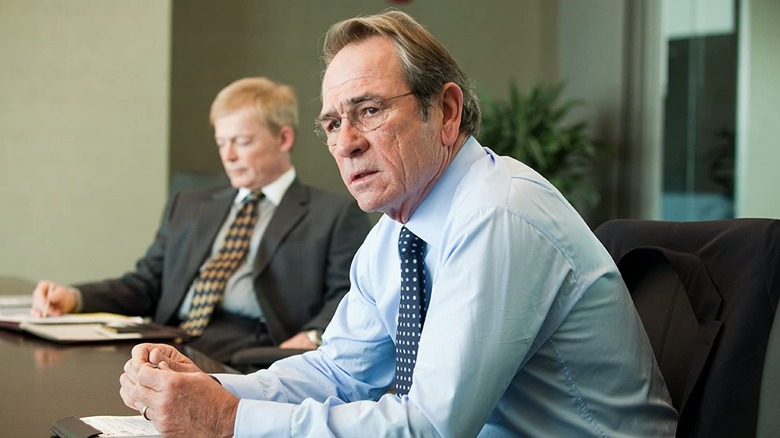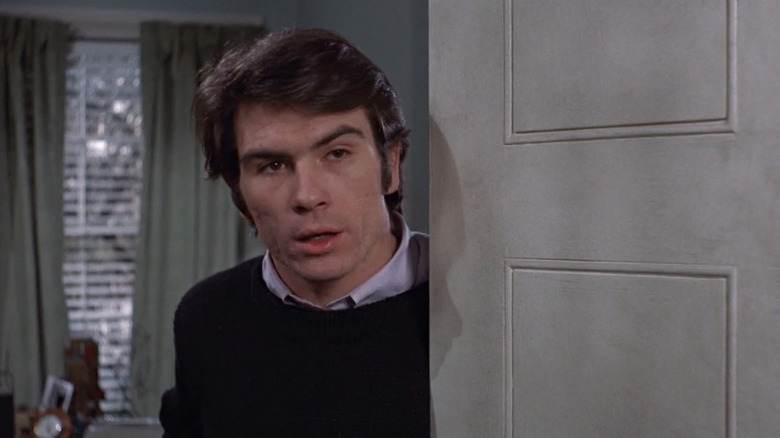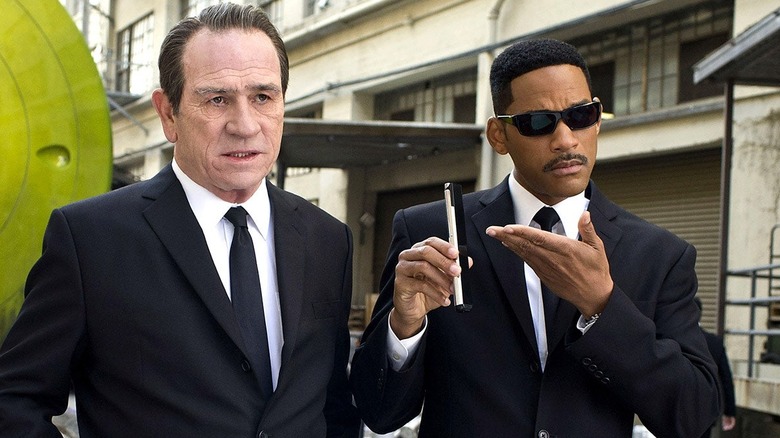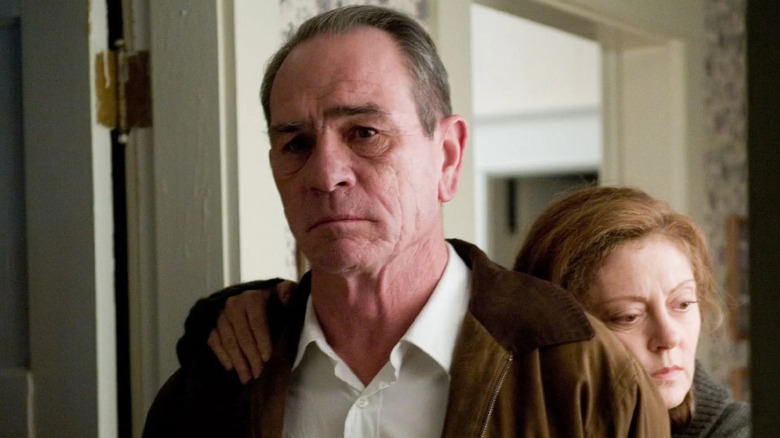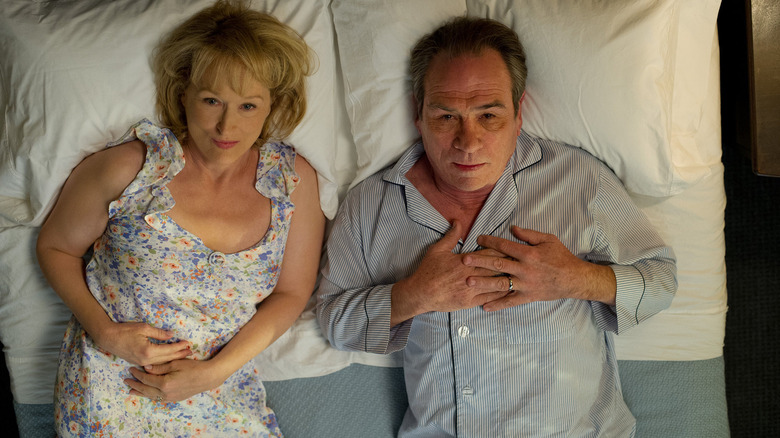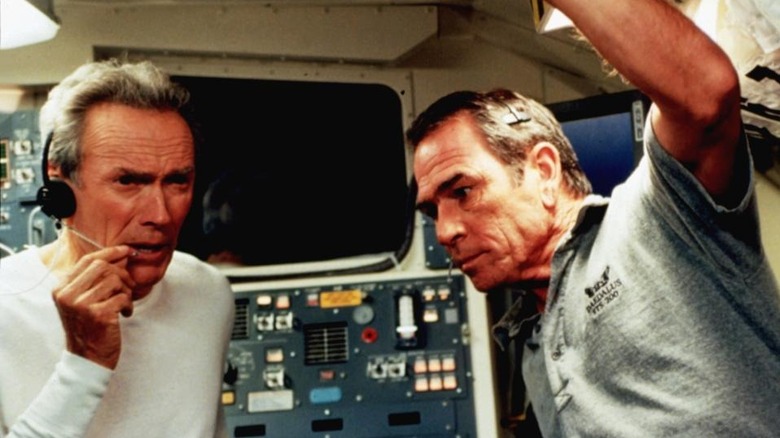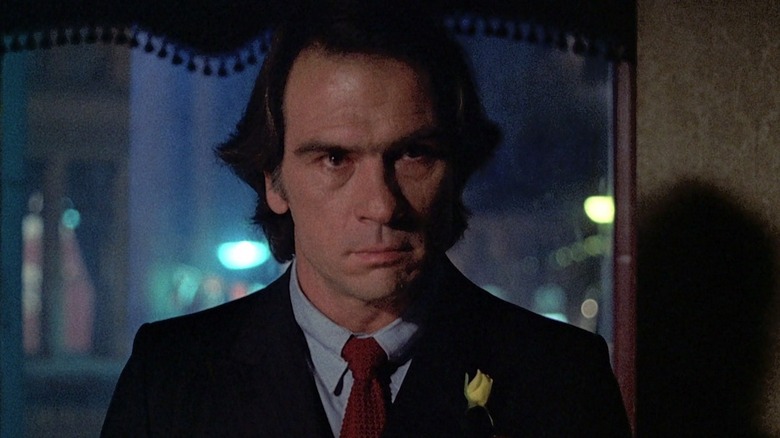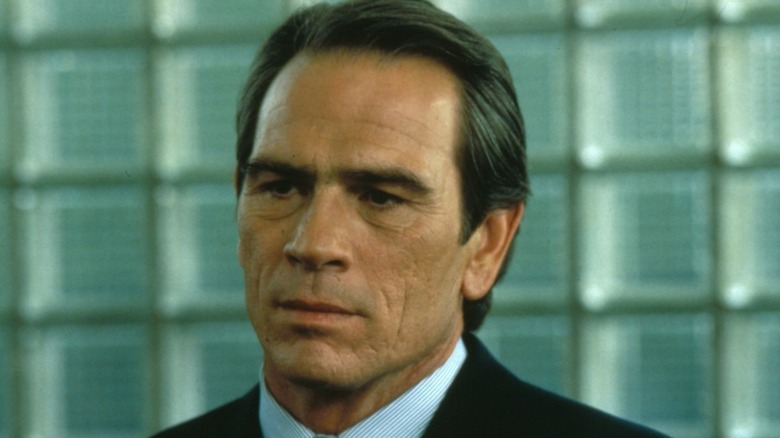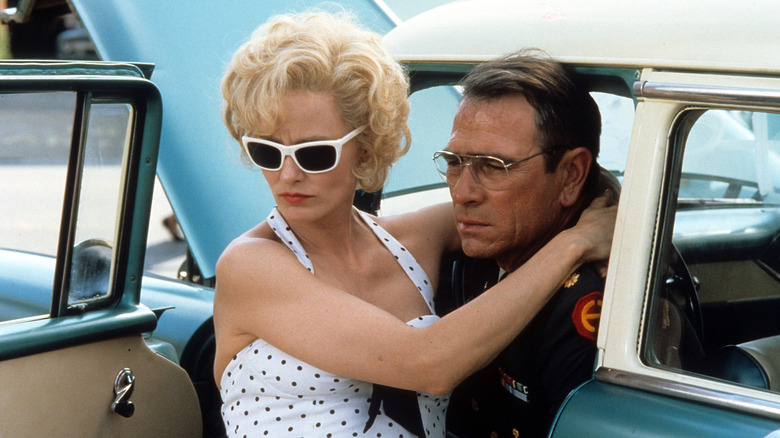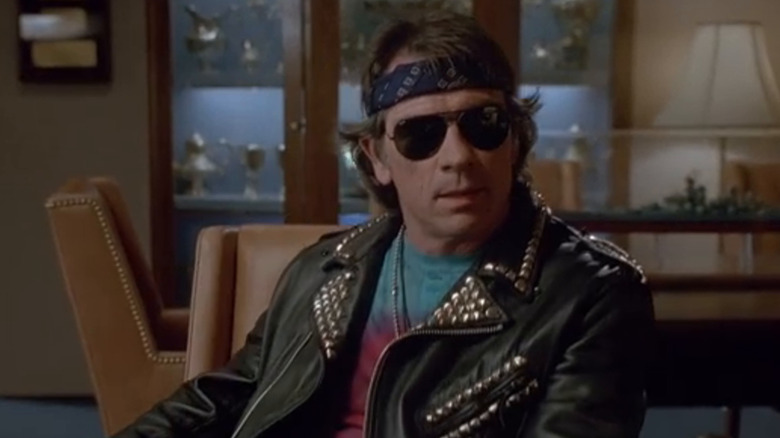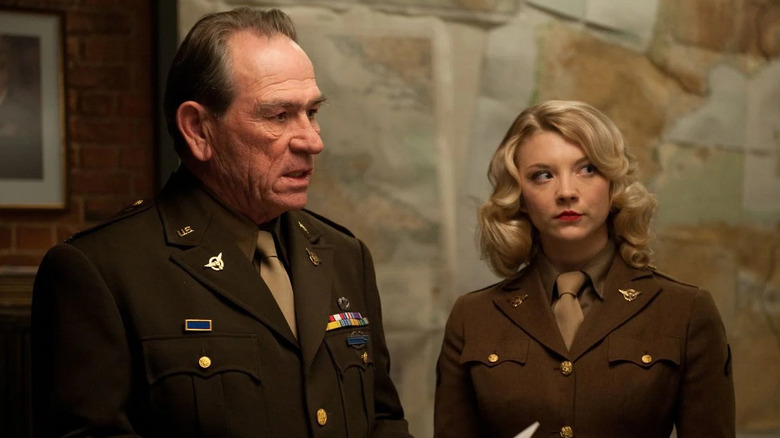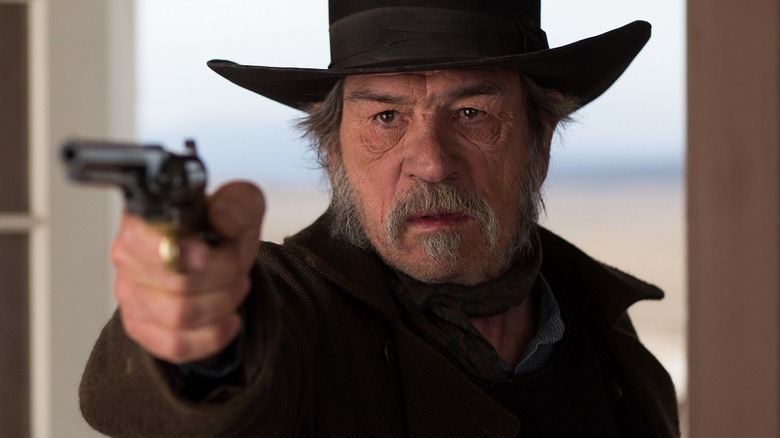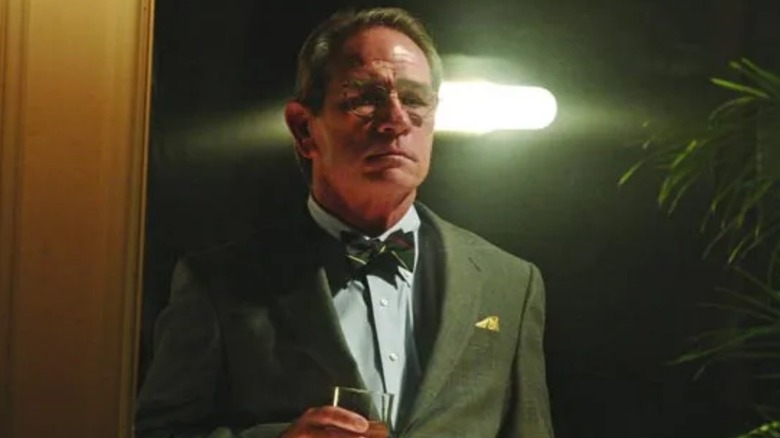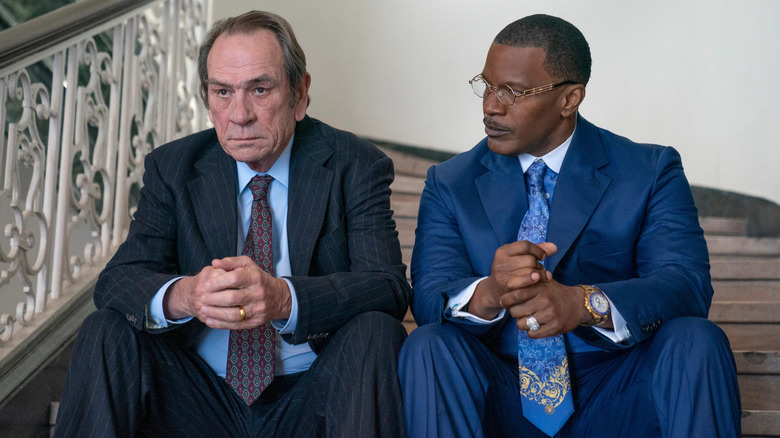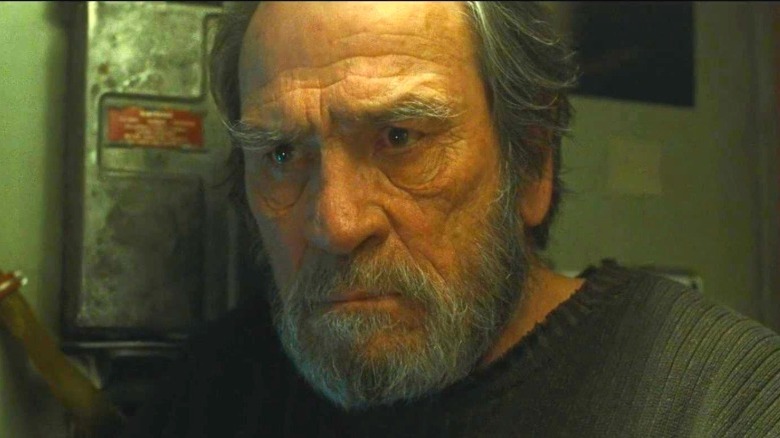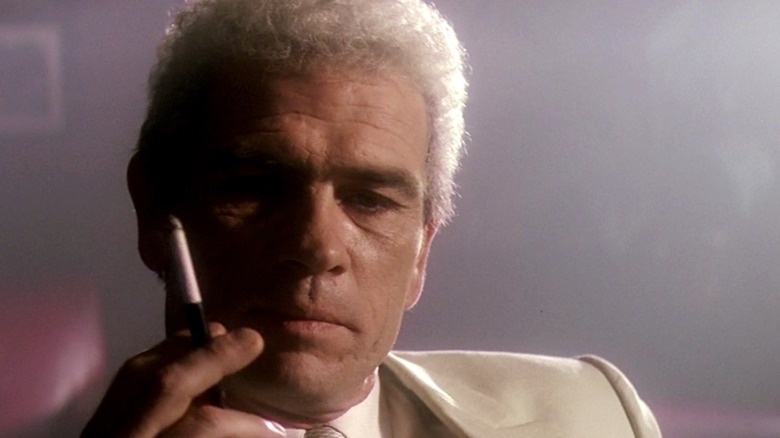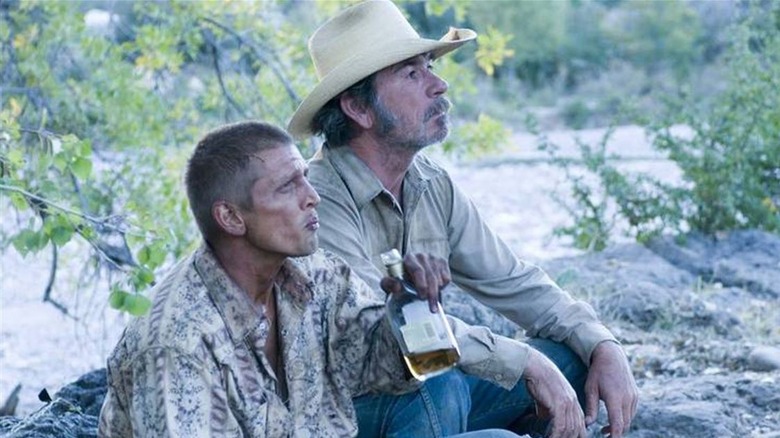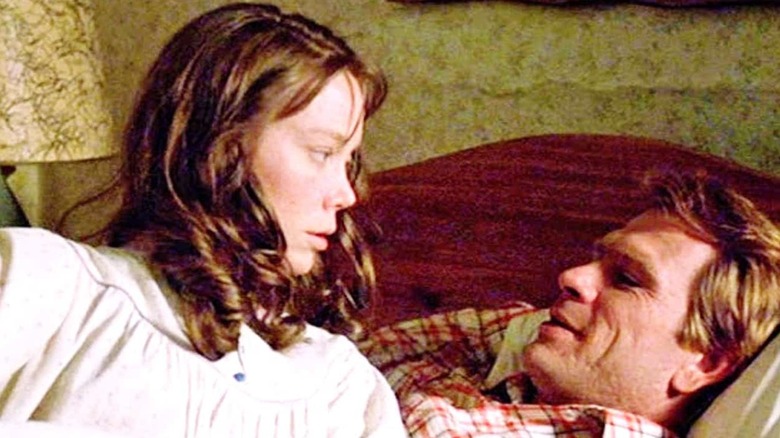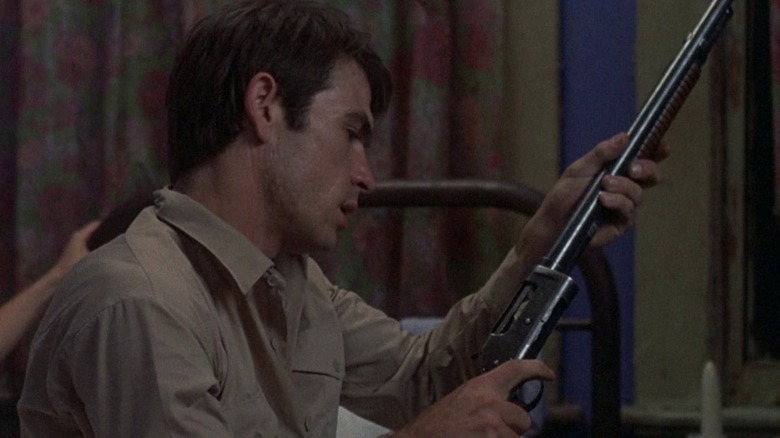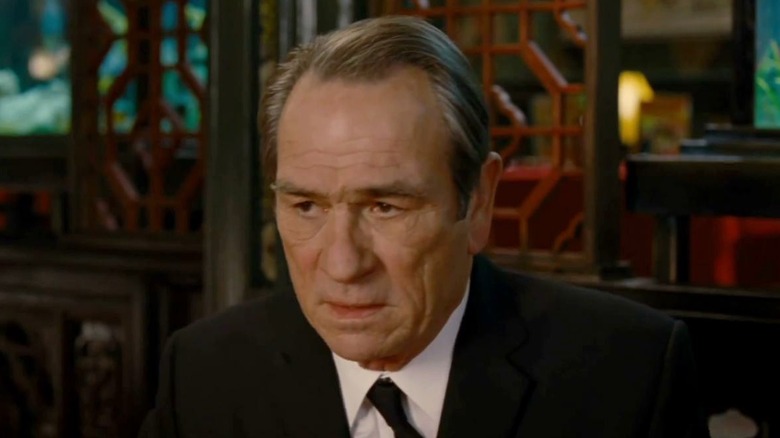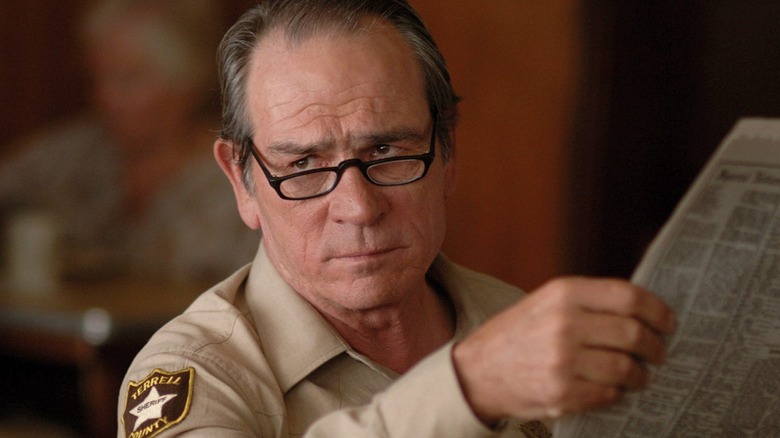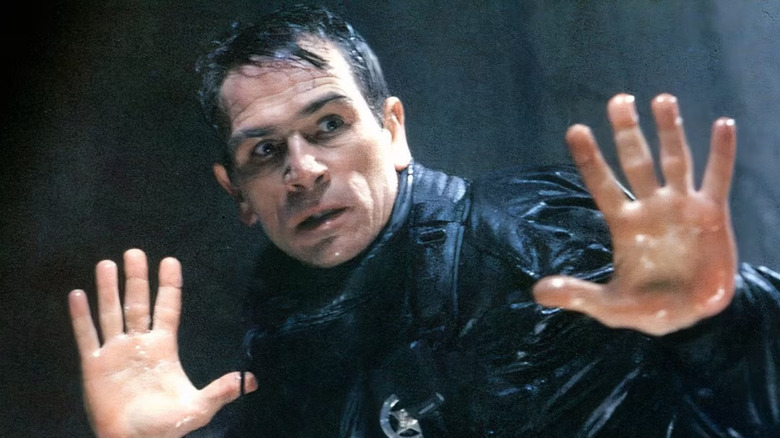Every Tommy Lee Jones Movie Ranked Worst To Best
Before he became an Oscar-winning actor, Tommy Lee Jones graduated from Harvard with a Bachelor's degree in English. During his college years, the young Jones played football and was roommates with, of all people, future Vice President Al Gore. Nevertheless, he was destined not for politics or sports but Hollywood stardom. In the 1960s, the Texas native moved to New York City and followed his dreams. After making his Broadway debut in 1969, he made his first feature film appearance in 1970's "Love Story," and — long story short — his career has been going strong ever since.
Here, we will take a look at every Tommy Lee Jones movie and see how they stack up according to the review aggregate site, Rotten Tomatoes. However, these rankings will not include made-for-TV projects, like his Emmy-winning performance in the 1982 adaptation of Norman Mailer's "The Executioner's Song," or his tremendous performance in "The Sunset Limited," based on the Cormac McCarthy play. With that in mind, this is every Tommy Lee Jones movie, ranked from worst to best.
59. Finestkind
"Finestkind" finds the Academy Award-winning Tommy Lee Jones in an elevated "geezer teaser" role: a movie where the bigger star only plays a small part in order to secure financing and slap his mug on the promotional materials. While this sub-genre is usually reserved for aged action stars like Arnold Schwarzenegger, Steven Seagal, and Bruce Willis, it can also apply to acclaimed thesps like Jones too. Ultimately, the result is the same; a mediocre movie.
"Finestkind" finds bored, college-educated wanderer Charlie (Toby Wallace) coming to New Bedford, Massachusetts to visit his commercial fisherman half-brother, Tom (Ben Foster). Disillusioned with his white collar life, Charlie joins Tom on a fishing job, where the crew barely survives a ship explosion at sea — but can they survive the turmoil that follows in its wake?
There's disappointed rich daddies, Boston crime gangs, and a small-time drug dealer with a heart of gold (Jenna Ortega, in what feels like a contractually obligated performance). Jones plays Tom's father, Ray Eskridge, captain of the titular Finestkind, in what starts as a role to service the plot, but potentially portends much more. As an esteemed elder statesmen, Jones lends credibility and gravitas to a cliche-riddled production that doesn't deserve it. Critics didn't care for it, with Koimoi saying, "The excellent performances by Jenna Ortega, Tommy Lee Jones and Ben Foster are trapped inside one of the most boring films of the year."
58. Nate and Hayes
This 1983 swashbuckling adventure film (one of many produced in the wake of "Indiana Jones and the Raiders of the Lost Ark") marked an early leading role for Jones. Unfortunately, it also boasts a rare "perfect" score of 0% on Rotten Tomatoes. Like "Indiana Jones" before it, "Nate and Hayes" (also called "Savage Islands" in some territories) attempts to combine romantic adventure with a rough and tumble story about tough guys fighting across a picturesque landscape. Unfortunately, the film somehow manages to fumble at every single turn.
Loosely inspired by the real-life pirates "Bully" Hayes and Ben Pease, the film is about as historically accurate as a "Pirates of the Caribbean" movie, but that's hardly the point of an adventure film like this. Maybe a story rooted in the actual adventures of Hayes and Pease would have been more interesting than the drivel on display here. "Nate and Hayes" follows a missionary and his fiancee (Michael O'Keefe and Jenny Seagrove) as they find themselves caught in between a blood feud between rival pirates Hayes and Pease (Jones and Max Phipps).
Critics like Roger Ebert trashed the movie, citing a lack of competent action and an inexplicable plot that moves from one cliche to the next with no care towards characterization or storytelling logic. Jones' career was starting to take off by 1983, but this movie certainly did the rising star no favors.
57. Just Getting Started
Director Ron Shelton cut his teeth on classic sports movies like "Bull Durham," but his career sputtered out following the release of 2003's "Hollywood Homicide." The action-comedy film was reviewed so poorly that it effectively locked Shelton out of directing features for over a decade. In 2017, Shelton returned with "Just Getting Started," another action-comedy that wound up with somehow even worse reviews.
Morgan Freeman stars as Duke, a man in witness protection who quietly runs a fancy resort community — but not quietly enough. When retired FBI agent Leo (Tommy Lee Jones) arrives at the resort, they begin a rivalry over petty pride and high-stakes competition. Their contests extend to their mutual fondness for the resort's regional director, played by Rene Russo. However, when mobsters show up looking to murder Duke for his past deeds, the pair needs to set aside their differences and save the day.
While there is inherent value in a movie starring senior citizens as the lead actors, it would have been preferable to see them appearing in something better than this utterly disposable tripe. Critics found the comedy lazy, and the action sequences on par with an episode of "Murder, She Wrote." While Jones and Freeman are having fun in the film, "Just Getting Started" feels like it never really gets going. Ron Shelton is a terrific director, just not cut out for the action-comedy genre.
56. Man of the House
In some ways, "Man of the House" is a perfect fit for Tommy Lee Jones. It's a lighthearted action-comedy in which he stars as a tough-as-nails Texas Ranger assigned to protect a squad of college sorority cheerleaders. In addition to acting in it, Jones also serves as executive producer, a rare credit for him. The film is directed by Stephen Herek, who called the shots on such beloved films as "Bill & Ted's Excellent Adventure" and "The Mighty Ducks." Unfortunately, something went wrong.
Critics tore into "Man of the House," taking aim at its lack of humor and anemic action. The premise, of a no-nonsense cop forced to cohabitate with titillating college co-eds, could barely support a sitcom pilot, much less a 100-minute film. If there's any entertainment value to be gained from "Man of the House," it's that Jones plays his role completely straight, which has a certain degree of charm. There's also his romantic subplot with a college professor played by Anne Archer, which feels like a collection of deleted scenes from a completely different film spliced into this one.
55. Fire Birds
The Seattle Times compared "Fire Birds" (released in some countries as "Wings of the Apache") to a video game, in that it's high on spectacle and helicopter gunship action and low on just about everything else. That's not inherently a bad thing if you're looking for little more than 87 minutes of explosions. Nicolas Cage stars as a hotshot pilot assigned to a joint DEA and U.S. Army operation to take down a South American drug kingpin. Sean Young plays his girlfriend, who is also a hotshot pilot, while Tommy Lee Jones plays his instructor, who just so happens to be a hotshot pilot himself. Together, they blow stuff up.
"Fire Birds" was quietly dismissed by critics, who rightly denounced it as a "Top Gun" ripoff, only with helicopters instead of fighter jets. That being said, the film does contain some truly magnificent visuals for fans of helicopter stunts, non-stop explosions, and Nicolas Cage's particular style of overacting.
54. The Betsy
Based on the novel of the same name by Harold Robbins, 1978's "The Betsy" stars the great Lawrence Olivier as Loren Hardeman, a Henry Ford-esque automobile magnate. Robert Duvall plays his grandson, and Tommy Lee Jones is a race car driver working on a new, fuel-efficient vehicle that could change the automobile industry forever, as Hardeman's final masterpiece and gift to the world. Overwrought soap opera antics ensue.
While there is certainly joy to be had watching Olivier ham it up while forcing his facsimile of a Texas accent, the film plays out like trashy gibberish. "The Betsy" was eviscerated by critics, who took great joy in denouncing its trashy self-importance while lamenting the complete lack of self-awareness toward its unintentional hilarity. "The Betsy" is the type of pretentious drama that would work better with a laugh track, though it can be enjoyed in a "so bad, it's good" sort of way.
53. U.S. Marshals
After the phenomenal critical and commercial success of "The Fugitive," Warner Bros. decided to give the film an unorthodox sequel. In 1998's "U.S. Marshals," Dr. Richard Kimble, the character played by Harrison Ford in the original film, is completely absent. Instead, the focus is on Jones' Sam Gerard and his titular team of U.S. Marshals, several of whom also return from "The Fugitive."
In "U.S. Marshals," Gerard and his team pursue a fugitive, played by Wesley Snipes, who, like Kimble before him, happens to be maliciously implicated in a fiendish conspiracy. The result can be succinctly described as "'The Fugitive,' but not as good." While Wesley Snipes is a fantastic actor, his story lacks the palpable momentum of Richard Kimble's noir-tinged adventure.
There's nothing about "U.S. Marshals" that is outright bad; it's just painfully derivative, and almost every twist and turn is a weaker copy of a similar scene from "The Fugitive." That being said, those looking for a film to scratch their "Fugitive" itch can do a lot worse than "U.S. Marshals," a serviceable thriller with some exciting action sequences.
52. Double Jeopardy
"Double Jeopardy" is infamous for having some of the biggest plot holes in cinema history. The film revolves around a woman (Ashley Judd) who is convicted of the murder of her husband (Bruce Greenwood). However, when she learns that he faked his death and framed her for the crime, she resolves to murder him for real in revenge, reasoning that she can get away with it since the legal rule of "double jeopardy" means she can't get in trouble for the same crime twice.
Needless to say, that's not how the concept of double jeopardy works, but nobody informed the filmmakers of that fact. For those who can get past this ridiculous plot device, they will find little more than a derivative clone of "The Fugitive," with Judd on the run, seeking justice, framed for a crime, and pursued by Tommy Lee Jones.
"Double Jeopardy" was released in 1999, a year after another derivative "The Fugitive" clone, "U.S. Marshals," which at least had the excuse of being an official sequel to "The Fugitive." Regardless of its critical drubbing, "Double Jeopardy" was a commercial success, grossing a cool $177 million worldwide, securing a tidy profit for the $70 million production budget.
51. The Family
French action auteur Luc Besson brought a unique brand of off-kilter pop art sensibilities to 2013's "The Family," a Mafia-themed satirical black comedy starring Robert De Niro and Michelle Pfeiffer. Based on the novel "Malavita" by Tonino Benacquista, "The Family" follows a mafioso and his family who are taken into the federal witness protection program. They are relocated to Normandy, France, where their efforts to blend in with the local population are undermined by their proclivity towards crime.
Tommy Lee Jones plays the FBI agent assigned to protect them, though one gets the impression he wouldn't be terribly upset if they were to all get blown up by a car bomb. He has nice chemistry with De Niro, who plays the mafioso patriarch, but otherwise plays more of a plot device than an actual character.
Reception to "The Family" was mixed, though fans of mean-spirited comedy may appreciate it. The gangster family members embody the "ugly American" stereotype to a certain degree, and they cause a lot of collateral damage in their quest for self-actualization. However, the film's grasp on reality is tenuous enough that the abrupt bursts of violence can be jarring. It's not for everyone, but "The Family" is an entertaining diversion for those looking for a different take on the Mafia genre.
50. The Hunted
A 2003 action thriller directed by William Friedkin, "The Hunted" stars Benicio Del Toro as Aaron Hallam, a Delta Force soldier who has post-traumatic stress disorder from his career of violence. He goes AWOL and hides out in a quiet Oregon forest, but after he murders several deer hunters he believes were sent to kill him, the government recruits his old instructor, L.T. Bonham, to help take him down.
On the one hand, there's little in "The Hunted" that wasn't done two decades earlier in "First Blood." On the other hand, nobody understands male pathos like William Friedkin. He digs into the shattered psyches of his main characters, deconstructing their macho facade to harvest their tightly-guarded emotions like precious diamonds. Along the way, "The Hunted" delivers moments of unsettling violence which culminates in a brutal showdown between Hallam and Bonham.
Reviews were surprisingly mixed, with critics suggesting "The Hunted" doesn't bring anything new to the table beyond its examination of testosterone. Additionally, Friedkin's uncompromising and relentless depictions of violence prevented the film from resonating with audiences and critics. "The Hunted" bombed at the box office and was quickly forgotten.
49. Criminal
In 2016's "Criminal," directed by Ariel Vromen, Kevin Costner stars as Jericho, a brain-damaged convict who is given an experimental procedure that implants the memories of murdered CIA agent Bill Pope (Ryan Reynolds) into his brain so that he can finish the agent's mission. Tommy Lee Jones plays the neurosurgeon, Dr. Franks, who performs the sci-fi surgery. When Jericho escapes, the film becomes an action thriller as Jericho slowly accepts Pope's influence on his psyche and learns to fight for the greater good.
The rote story beats of "Criminal" don't do enough to justify its high concept premise, though Costner does shine as a mentally deranged psychopath forced to (essentially) share his soul with the essence of a good man. Tommy Lee Jones is something of a non-entity in the film, though it's admittedly nice to see him in a non-action role that allows him to display his warm, compassionate side — well, warm by his standards, at least. "Criminal" is worth watching for Kevin Costner's fantastic performance, but it doesn't have much to offer beyond that.
48. Mechanic: Resurrection
As the sequel to a remake, "Mechanic: Resurrection" doesn't have much reason to exist. This 2016 film is not as good as its predecessor, 2011's "The Mechanic," which isn't as good as the 1972 Charles Bronson movie, "The Mechanic." Still, even with the law of diminishing returns at play, there's some fun action to be enjoyed in "Mechanic: Resurrection," as well as a surprisingly strong turn from Tommy Lee Jones in a role that doesn't demand such dedication. He even sports a sweet soul patch on his chin!
Jones plays Max Adams, one of the targets that Jason Statham's character is sent to assassinate. However, it's revealed that Adams is not a fiendish villain, but a sympathetic figure, so they team up to take down the film's true villain. It's a pretty standard twist, but Jones is compelling to watch, and his scenes with Statham showcase some genuine chemistry. "Mechanic: Resurrection" is a pretty standard action flick by most metrics, but there's nothing wrong with that on a Saturday night with pizza and friends.
47. Shock and Awe
In 2003, the United States went to war with Iraq under questionable pretenses, with government officials citing Saddam Hussein's relationship with Osama bin Laden and possession of weapons of mass destruction, which were never found. While much of the country's media backed up the government's unsubstantiated claims, Jonathan Landay and Warren Strobel wrote articles that countered stories by larger outlets. In hindsight, Landay and Strobel are recognized as the journalists who "got Iraq right," according to HuffPost.
Director and star Rob Reiner set out to tell their story in 2017's "Shock and Awe." Unfortunately, despite an all-star cast and good intentions, the film plays out more like a high school PowerPoint presentation than a movie. Rather than focusing on a cohesive narrative and believable characters, "Shock and Awe" is all about talking heads spewing talking points. The result is like an episode of "Real Time with Bill Maher," but without the jokes.
Tommy Lee Jones plays Joe Galloway, the real-life war correspondent who helps the film draw parallels between America's failure in Vietnam with its contemporary war in Iraq. Galloway was previously portrayed by Barry Pepper in 2002's "We Were Soldiers."
46. Emperor
In "Emperor," Tommy Lee Jones shines as General Douglas MacArthur, a role he was arguably born to play. Directed by Peter Webber, "Emperor" follows Brigadier-General Bonner Fellers (Matthew Fox), who is tasked with arresting Japanese war criminals in the aftermath of the nuclear attacks on Japan that ended World War II.
"Emperor" deserves praise for casting authentic Japanese actors as Japanese characters, even though the film falls far short of greatness. Despite its intriguing premise of investigating the role of Emperor Hirohito in the closing days of World War II, "Emperor" feels obligated to add an entirely fictional romantic subplot that sucks up much of the film's energy.
There's so much the film could explore with Hirohito and the politics involved with his role in post-war Japan, but instead, the movie spends way too much time on melodramatic puppy love flashbacks. It also doesn't help that Tommy Lee Jones has a much smaller role than one might expect. He's mostly relegated to bookending the film when he should be playing center stage in a much better movie.
45. The Comeback Trail
The original version of "The Comeback Trail" was released in 1982, while this remake was supposed to hit U.S. theaters in 2020. However, it was removed from the schedule and quietly released on digital storefronts instead. While no reason was ever given for the sudden change, it's possible it had to do with the fact that dramas weren't drawing crowds at movie theaters anymore, especially films targeting older viewers in the post-pandemic cinematic marketplace.
It's ironic and perhaps a little tragic, since the remake of "The Comeback Trail" is all about the magic of the movies. Robert De Niro stars as Max Barber, a movie producer who resolves to pay off his mob debt by collecting insurance money gained by having the star of his latest movie die in a rigged stunt-gone-wrong. However, his star, Duke Montana (Tommy Lee Jones), a washed-up has-been, finds himself reinvigorated by the prospect of starring in a movie after so many years of inactivity, which inevitably causes Max to rethink his mean-spirited murder plan.
While "The Comeback Trail" failed to light a fire within critics, it's nonetheless a charming little comedy about Hollywood and the transformative power of cinema to inspire people to change their lives for the better. It's not perfect, but the broad comedy mostly succeeds, and Jones is fantastic as a faded old star.
44. Jackson County Jail
Produced by the king of low-budget cinema, Roger Corman, "Jackson County Jail" looks at a glance like a trashy little exploitation film. It stars Yvette Mimieux as Dinah, a woman who has her life turned upside down while on a cross-country drive from Los Angeles to New York. She's robbed, jailed on false pretenses, sexually assaulted multiple times, and kills a man in self-defense before going on the run with the aid of a fellow prisoner, Coley (Tommy Lee Jones).
"Jackson County Jail" is a perfect example of post-Watergate 1970s cynicism. Nothing goes well for the heroes of the film, and it's clear from the outset that Dinah is doomed; it's just a matter of how long she can hold on before the inevitable wipeout.
The film was successful enough to spawn a television pilot that was actually a re-edit of the film with new scenes intended to segue into a series, but nothing ever came of it. The pilot, called "Outside Chance," has never been officially released on home video. A remake, "Macon County Jail," was released in 1997, starring Ally Sheedy and David Carradine, but it was unsuccessful.
43. Rules of Engagement
Another collaboration with director William Friedkin, 2000's "Rules of Engagement" stars Samuel L. Jackson as Colonel Childers, who orders an attack on a crowd of civilians in Yemen, killing dozens of protestors. At his trial, Childers is defended by his old Vietnam buddy, Colonel Hodges (Jones), who must uncover the truth behind what really happened on that fateful day. It's a military-themed courtroom drama with little in the way of novelty or surprise.
The film explores the dynamic between the two men while following the trial with a melodramatic flair that feels like a lesser knock-off of "A Few Good Men," which was released several years earlier. Despite having a big-time Hollywood budget, Friedkin can't rally the same energy he did in his 1997 television version of "12 Angry Men." As a result, "Rules of Engagement" has some good ideas and is buoyed by the performances of its lead actors, but fails to inspire much in terms of excitement or thought-provoking drama.
42. Blown Away
If there's one thing people remember from 1994's "Blown Away," it's Tommy Lee Jones' ridiculous attempt at an Irish accent. If there's a second thing they remember, it's how the film got trounced at the box office by "Speed," another movie about a mad bomber trying to blow stuff up while squaring off against a tough-guy cop.
In "Blown Away," Jones plays the bomber, Gaerity, and Jeff Bridges plays the cop, Jimmy Dove, who used to be an IRA terrorist before he resolved to change his life for the better. They are old enemies from Northern Ireland, and their conflict has followed them to the United States. Notably, Lloyd Bridges, Jeff's real-life father, plays Dove's uncle, a retired cop who finds himself targeted as part of Gaerity's vendetta.
The film failed to break out at the box office and was quickly forgotten, as is the fate for so many unremarkably average action movies. Still, it's worth watching, just for Jones' Irish accent, which must be experienced firsthand.
41. Men in Black 2
Apart from the reboot "Men in Black International," the lowest-rated "Men in Black" film on Rotten Tomatoes is the first sequel, 2002's "Men in Black II." While the core sci-fi action and satirical humor are as entertaining (if not nearly as fresh) as before, the sequel lacks the subversive edge of the first film and feels like a safe, family-friendly cash-in.
Despite the heartwarming ending of the original, which saw Agent K (Tommy Lee Jones) retire from the MiB organization and a more experienced Agent J (Will Smith) taking on the role of mentor to a new partner, "Men in Black II" undoes basically all of that. The first act of the film jumps through hoops to reestablish the status quo from the first movie, with Agent K as the seasoned veteran and Agent J as his young, hip, in-over-his-head sidekick. As a result, too much of "Men in Black II" feels like a rehash of the original, with only a few new ideas to mix things up.
It's a shame, too, since the original concepts in "Men in Black II" are worthwhile pursuits. The villain, played by Lara Flynn Boyle, is entertaining and sufficiently dangerous, while the subplot about Rosario Dawson and her connection to Agent K's past is far more interesting than reused gags involving Frank the Pug or the coffee-loving alien worms. There's fun to be had in "Men in Black II," but it's an inferior copy of its original.
40. Batman Forever
The role of Harvey Dent was originally played by Billy Dee Williams in Tim Burton's 1989 "Batman" film, but when the time came for the character to make his return as the villain Two-Face, the new creative team responsible for "Batman Forever" decided to revamp the character completely, and not for the better.
While "Batman Forever" has developed something of a cult following in the decades since its 1995 release, one element that is universally despised is Tommy Lee Jones' version of Two-Face. In the comics, Two-Face has a broken psyche and believes the only valuable morality in the world is luck, which is why he carries a coin — to leave the binary choices of life and death to pure chance. In the movie, Two-Face is basically a clone of the Joker who likes flipping a coin and bases his aesthetics on duality.
While it can be fun to see Tommy Lee Jones ham it up as a Joker-esque Batman villain straight out of the Silver Age, the movie could have been so much deeper if Harvey "Two-Face" Dent had a bit more depth to his character beyond a gnarly makeup job. Besides, when it comes to cartoonish, over-the-top bad guys, "Batman Forever" already has Jim Carrey's fantastic take on the Riddler. A second wacky bad guy tips the scales in the wrong direction.
39. Eliza's Horoscope
On paper, "Eliza's Horoscope" looks like a romantic comedy. Elizabeth Moorman plays Eliza, a woman who believes in the significance of astrological signs. She is convinced the stars are telling her she will find her soul mate imminently. Thus, she sets out on a quest to find a husband. However, "Eliza's Horoscope" is anything but a typical rom-com. Tommy Lee Jones plays a would-be love interest who is also a domestic terrorist plotting to destroy a public landmark.
"Eliza's Horoscope" feels like a relic from the late 1960s, with overtly psychedelic sensibilities and a plot that works more on a symbolic level than a literal one. Most of the story is told through surreal vignettes that don't make much sense when taken on their own — and honestly don't make much more sense within the context of the film. The movie is a labor of love from writer and director Gordon Sheppard and is the only feature film Sheppard ever made.
38. Back Roads
"Back Roads" stars Jones and Sally Field as mismatched romantic leads. Jones plays Elmore, a down-on-his-luck boxer with barely a penny to his name, while Field plays Amy, a streetwise prostitute. When Elmore solicits Amy's services but can't afford to pay when the bill comes due, the ensuing altercation draws the attention of the police. Long story short, Elmore and Amy go on the run together.
If this sounds like the premise of a raunchy but disposable 1980s comedy, that's only because that's exactly what "Back Roads" is. Infamously, Field and Jones did not get along during filming, with Jones frequently expressing open contempt towards his more famous co-star. Field commented to Entertainment Weekly, "We fought like cats and dogs." However, he apologized years later, and Field graciously accepted his sincere sentiment.
"Back Roads" is worth watching just to see Jones playing outside of his usual, buttoned-up style, but it doesn't have much going for it beyond that, save for Sally Field's sexy outfits and Farrah Fawcett-inspired hairdo.
37. Heaven & Earth
Oliver Stone, a veteran of the Vietnam War, made multiple films about that conflict, including "Platoon" and "Born on the Fourth of July," both of which were hits in the 1980s. For the third film in his unofficial Vietnam trilogy, Stone drew on the life experience of Le Ly Hayslip, a Vietnamese woman who lived through the war. Released in 1993, "Heaven & Earth" is loosely based on the life of Le Ly, based on her two memoirs, "When Heaven and Earth Changed Places" and "Child of War, Woman of Peace."
Newcomer Hiep Thi Le stars as Le Ly, whose life in Vietnam during the rising tensions forms the backbone of the story. Tommy Lee Jones is introduced halfway through the film as Gunnery Sergeant Steve Butler, a character inspired by Le Ly's real-life husband. In the movie, Butler and Le Ly fall in love in Vietnam, and he brings her home with him to America, where they live together, though their relationship is impacted by Butler's violent nature and post-traumatic stress disorder, leading to a tragic finale.
In comparison to its predecessors, "Heaven & Earth" was not a critical or financial success, but it retains a strong following. At the very least, it's important to have movies about the Vietnam War that aren't directly about frontline fighters but the innocent people trapped in a violent time and place.
36. Black Moon Rising
The eponymous Black Moon of "Black Moon Rising" is a prototype vehicle that is faster than anything else and runs on tap water instead of gasoline. Tommy Lee Jones plays Quint, a thief and FBI contractor helping them build a case against a Las Vegas corporation. He hides the evidence in the Black Moon, which is then stolen by a gang of thieves led by Linda Hamilton (of all people!), forcing Quint to recover the stolen vehicle to secure his payday. Throw in Fear frontman Lee Ving as his violent rival, and you've got yourself a middle-of-the-road action movie that's inoffensive and unremarkable.
"Black Moon Rising" is written by John Carpenter, who claimed in a 2016 interview to have never seen the finished film. If he had directed it, perhaps "Black Moon Rising" could have been a worthy successor to "Escape From New York," with its low-key sci-fi trappings and too-cool-for-school machismo. Unfortunately, despite some exciting car action and winning performances from Jones, Hamilton, and Ving, "Black Moon Rising" never asserts itself as anything special. It's a competent movie but also utterly disposable.
35. Wander
A thriller in the vein of "Conspiracy Theory" and "The Game," 2020's "Wander" stars Aaron Eckhart as Arthur Bretnik, who learns that his belief in off-the-wall conspiracy theories may actually be true. Arthur co-hosts a podcast with his friend Jimmy Cleats, played by his fellow Two-Face actor, Tommy Lee Jones. Together, they wind up investigating a murder that leads to a conspiracy theory with ties to Arthur's own past. Heather Graham, Raymond Cruz, and Katheryn Winnick co-star.
"Wander" may be absurd, but it leans into its eccentricity to justify its increasingly ridiculous plot twists. The script may occasionally fly off the rails, but Eckhart keeps things anchored with his believable performance as a man who is simultaneously vindicated and horrified when he learns the extent of the complex conspiracy. It's the type of movie that resonates more with viewers who are able to go along with its manic energy than with critics who get hung up on petty trivialities like logic and cohesive plotting.
34. Natural Born Killers
Directed by Oliver Stone, 1994's "Natural Born Killers" shocked audiences with its story of violent debauchery and perceived glorification of mass-murdering psychopaths. This reaction was in spite of the fact that the film's satirical leanings and black comedy aesthetics are intended to keep the viewer from taking its bleak subject matter too seriously. Woody Harrelson (who was never the same after making the movie) and Juliette Lewis star as Mickey and Mallory Knox, lovers who travel across the United States, committing crimes and amassing a cult of personality due to the media's sensationalist coverage of their depraved activities.
Tommy Lee Jones plays a supporting role as the warden of a prison that cannot contain the evil of Mickey and Mallory. However, he's an evil man in his own right, intoxicated by the power he commands over his dominion. He runs his prison with an iron hand, taking sadistic glee from the pain he inflicts on others. However, his cruelty comes back to haunt him when the Knox couple incites a riot in the prison, resulting in the warden getting literally ripped to pieces by rampaging inmates.
"Natural Born Killers" was hugely controversial upon release due to its violent content, but the outrage only fueled interest. Although the film was ultimately a box office failure, it instantly became one of the most iconic movies of the 1990s.
33. Volcano
Some movies are too silly to work, but are fondly remembered regardless. "Volcano," released in 1997, is corny and ham-handed but endearing. The idea of an active volcano under the La Brea Tar Pits in Los Angeles makes no sense from a geological perspective, but that's not the point of this movie. The point is to see Tommy Lee Jones rescue people from incredible special effects and witness dazzling displays of heroism from first responders saving innocents and sacrificing themselves while protecting their city.
As a cinematic work of art, "Volcano" is more of a VFX tech demo than a movie. Then again, when seen as a celebration of the human spirit in the face of adversity, "Volcano" is a crowd-pleasing triumph with scary visuals and visually inventive sequences. It helps that the cast is loaded with ringers, from Anne Heche and Don Cheadle to Keith David and a pre-"SATC" John Corbett. Simply put, "Volcano" is a perfect movie for simply turning one's brain off and enjoying the excitement.
32. The Big Town
Released in 1987, "The Big Town" follows the adventures of J.C. Cullen (Matt Dillon), a hotshot gambler in 1957 Chicago who gets involved in a classic film noir plot involving love triangles, organized crime, and shady businessmen scheming against each other. Cullen is caught in the middle of it all, wooing married women, smoking cigarettes, and gambling — basically, all the super cool things you're not supposed to do.
While unsuccessful at the box office, "The Big Town" is the movie that served as a transition for teen heartthrob Matt Dillon into a hunky adult actor. While critics were mixed on the film, "The Big Town" makes great use of its 1950s setting, with excellent production design and costumes that really evoke the period. The supporting cast is full of fantastic players, including Diane Lane (in full noir femme fatale mode), Bruce Dern, and, of course, Tommy Lee Jones.
31. Eyes of Laura Mars
Before he made "Halloween" and "Escape From New York," John Carpenter wrote a short script called "Eyes." Producer Jack Harris optioned the story and worked with mega-producer Jon Peters to turn "Eyes" into a feature film. The result was 1978's "Eyes of Laura Mars," directed by Irvin Kershner, who went on to helm one of the greatest movies of all time, 1980's "Star Wars: The Empire Strikes Back."
Faye Dunaway stars as the title character, a fashion photographer in New York City who inexplicably begins seeing visions of a killer murdering people she knows. The visions turn out to be real, and as the body count rises, Laura finds solace in the burly arms of the detective in charge of investigating the case, John Neville, played by Tommy Lee Jones.
The film is renowned for its shocking twist ending, in which it's revealed that Neville suffers from multiple personality disorders and has been the killer all along. While the chemistry between Jones and Dunaway is good enough, the main draw of "Eyes of Laura Mars" is its 1970s New York City setting, lending a film noir fairy tale vibe to the story.
30. The River Rat
In 1984's "The River Rat," Tommy Lee Jones stars as Billy, who has just gotten out of prison. In an attempt to bond with his teenage daughter, Jonsy (Martha Plimpton), they collaborate on repairing a boat, the eponymous River Rat. However, when the prison doctor (Brian Dennehy) tries to blackmail Billy to learn the location of a hidden stockpile of cash, the father and daughter team must stay one step ahead of their new enemy while riding down the Mississippi River in search of hidden treasure.
Martha Plimpton is fantastic as a young, doe-eyed girl trying to bond with her father, while Jones is excellent as the father, trying to make up for lost time while trying to outrun his past in an effort to secure a future for his daughter. Of course, the true star of "The River Rat" is the Mississippi River itself. "The River Rat" is written and directed by Tom Rickman, a Kentucky native, who shot the film on location in his home state, showcasing the gorgeous scenery of the American South.
29. Jason Bourne
Nine years after "The Bourne Ultimatum" closed the Jason Bourne trilogy, and four years after "The Bourne Legacy" tried and failed to continue the story without its title character, Matt Damon returned to his signature role with 2016's "Jason Bourne." Director Paul Greengrass, who helmed the second and third "Bourne" films, also returns for this franchise revival, which sees Jason Bourne come out of retirement to take down the CIA director who had his father murdered.
Tommy Lee Jones plays CIA director Robert Dewey. As a villain, Dewey isn't an over-the-top scenery-chewer like Jones' characters from "Batman Forever" or "Under Siege." Instead, Dewey feels like the pencil-pushing brother of Sam Gerard from "The Fugitive." However, it's sometimes hard to tell if the character is aloof and impersonal or if Jones is disinterested in his performance. Sadly, there's nothing truly remarkable about Tommy Lee Jones' role in "Jason Bourne."
Though decently successful at the box office, "Jason Bourne" was dismissed by critics for being an unnecessary postscript to a story that ended two films earlier. It's a competent spy thriller, but nothing more, and certainly not up to the legacy of the original trilogy of "The Bourne Identity," "Supremacy," and "Ultimatum."
28. House of Cards
Not to be confused with the Netflix television series of the same name, 1993's "House of Cards" is a low-key family drama about a family trying to move on following the death of their patriarch. Kathleen Turner plays Ruth Matthews, a mother of two trying to pick up the pieces and help her family move on from their tragedy. Tommy Lee Jones plays Jake Beerlander, a child psychologist who believes one of Ruth's children is autistic. The film revolves around the mother's journey to understand and accept what it means to be the mother of an autistic child.
Written and directed by Michael Lessac, "House of Cards" hasn't aged well in its portrayal of autism, though it's never made clear if the young daughter has the disorder. After she gets it in her head that her dead father is somehow on the moon, she sets out to listen for his presence and contact him. It's unclear if she's autistic or extremely gullible. "House of Cards" is an overly saccharine movie, so sickeningly sweet as to induce diabetes. Whether it's charming or senseless drivel will likely depend on the viewer's mood.
27. In the Electric Mist
"In the Electric Mist," based on the novel by James Lee Burke, is a weird movie. It's ostensibly about a police detective in a small town in Louisiana. Tommy Lee Jones plays Dave Robicheaux, a character previously portrayed by Alec Baldwin in "Heaven's Prisoners," also based on a Burke novel. Robicheaux's murder investigation leads him to the set of a Civil War film, with the filmmakers emerging as suspects in the crime — but none of that is particularly important.
No, "In the Electric Mist" isn't so much about the murder investigation as it is Robicheaux's drug-fueled time travel adventure into the actual American Civil War. After his Dr. Pepper is dosed with LSD, Robicheaux finds himself in the company of Confederate general John Bell Hood, played by Levon Helm of The Band. Oddly, the film ends by confirming that Robicheaux didn't just have a drug trip but an actual time travel experience. At the last minute, "In the Electric Mist" basically throws in a plot twist from "The Shining" for no real reason that we can understand. We can't comprehend it, but we'll always cheer any movie that takes a big swing, even if it hardly makes sense.
26. The Missing
Director Ron Howard's 2003 Western, "The Missing," stars Tommy Lee Jones as Samuel Jones, the estranged father of Maggie Gilkeson (Cate Blanchett). When her own daughter, Lilly (Evan Rachel Wood), is kidnapped by a raiding party of human traffickers led by the truly monstrous "El Brujo" (Eric Schweig), the father and daughter duo embark on a rescue mission to save the young girl, and maybe repair their broken relationship in the process.
The film received mixed reviews and bombed at the box office, sputtering out at a mere $38 million worldwide, a far cry from its budget of $65 million. Additionally, its R-rated violence could be off-putting to certain demographics, though it could also be a key attraction to other viewers with a cinematic bloodlust. "The Missing" did receive praise for its accurate and respectful depiction of Apache culture, its portrayal of the real-life brutality of the Old West, and the warm chemistry between Jones and Blanchett.
25. The Package
The first of three films Jones made with director Andrew Davis (the others being "Under Siege" and "The Fugitive"), 1989's "The Package" is a throwback to 1970s-style political thrillers. Gene Hackman stars as a former Green Beret who tries to unravel a conspiracy to sabotage nuclear peace talks between the United States and the Soviet Union. Tommy Lee Jones plays a ruthless assassin trying to make sure the peace talks fall apart and killing anyone who gets in his way.
The supporting cast includes Joanna Cassidy, Dennis Franz, and Pam Grier. "The Package" failed at the box office but is notable for setting the stage for future collaborations between Davis and Jones, culminating in the latter's Oscar win for "The Fugitive." When taken on its own merits, "The Package" is a smart little thriller with competent action sequences and winning performances by Jones and the always-engaging Gene Hackman. It's too bad it's mostly forgotten these days.
24. Cobb
"Cobb," based on the legendary baseball player, Ty Cobb, is far from a typical biopic. Set almost entirely in 1960, decades after Cobb's glory days with the Detroit Tigers, the movie instead focuses on his final years and interactions with writer Al Stump, who wrote Cobb's biography. Jones stars as Cobb, while Stump is portrayed by Robert Wuhl.
In real life, Stump's biographies of Cobb have been largely refuted and debunked by baseball historians. The rumors and stories about Cobb have long since passed into the realm of legend, with the facts exaggerated and distorted beyond recognition, as happens to all great historical figures. By 1994, when the biopic was released, Ty Cobb was no longer a man but a modern myth.
It's impossible to know quite how the real-life Ty Cobb compares to the version seen in the movie, but nothing will ever change the fact that he is one of the greatest baseball players who ever lived. Either way, "Cobb" is a fascinating look at one interpretation of a complicated sports legend.
23. The Company Men
It's hard to sympathize with rich, pencil-pushing businessmen who are suddenly faced with unemployment, but 2010's "The Company Men," written and directed by John Wells, successfully tells a story about people whose life paths are suddenly forced to take an unexpected detour. Set in the wake of the 2008 financial recession, Ben Affleck, Chris Cooper, and Maria Bello play employees of a big company who get fired due to budget cuts. Tommy Lee Jones plays their advocate, who protests the firings to the big boss of the company (Craig T. Nelson), to no avail.
"The Company Men" received strong reviews but didn't become the Academy Awards hopeful that the filmmakers were likely banking on. It seems it was just too soon for working-class cinema enthusiasts to consider shedding a tear for businessmen in suits, even if they were victims of the financial crisis like everyone else. Still, "The Company Men" is worth watching for its solid performances and cinematography from the perennial fan-favorite, Roger Deakins.
22. Love Story
Before "The Notebook," there was "Love Story," the original melodramatic romantic novel adapted into a hit movie. Ryan O'Neal and Ali MacGraw star as young lovers whose blossoming relationship overcomes adversity from all sides before tragedy strikes when the woman is diagnosed with a terminal illness. The film was tremendously successful at the box office and earned seven Oscar nominations, including best picture. It also introduced this corny/romantic phrase into the public lexicon: "Love means never having to say you're sorry."
Tommy Lee Jones made his cinematic debut in "Love Story," in the minor role of Hank Simpson. Interestingly, he's credited under the name 'Tom Lee Jones,' rather than his customary 'Tommy.' The film is based on the novel by Erich Segal, who met Tommy Lee Jones and his roommate, Al Gore, at Harvard University in 1968, with the novel's male lead based on both Jones and Gore. Segal focused particularly on Jones' unique blend of machismo and emotional sensitivity. Indeed, that mix of traits is surely what's allowed Jones to remain an in-demand Hollywood star, even all these decades later.
21. Men in Black 3
The third "Men in Black" film was released in 2012, a full decade after "Men in Black II." The film involves a time travel plot that sends Will Smith's Agent J back in time to 1969 to prevent the murder of a young Agent K, played by Josh Brolin. As a result, Tommy Lee Jones only has around 15 minutes of screen time in "Men in Black 3," with Brolin filling his younger shoes for most of the film's duration. But Brolin does a great job as a younger version of K, who has lovely chemistry with this somewhat older, more experienced version of Agent J.
"Men in Black 3" grossed an impressive $624 million worldwide and was decently well-received by critics. Some critics noted that the film benefited from a relative lack of Tommy Lee Jones, who seems completely disinterested in the movie during his scenes. With that in mind, it was a wise choice for the filmmakers to have Josh Brolin pick up the slack. As it stands, Jones is never in the film long enough for the viewer to realize he's probably only in it for the paycheck.
20. In the Valley of Elah
Paul Haggis wrote and directed 2007's "In the Valley of Elah," a brutally realistic mystery story about Hank Deerfield (Tommy Lee Jones), a Vietnam veteran whose son, an Iraq War veteran, goes missing. In pursuit of the truth, Hank goes on an odyssey through his son's life, uncovering horrific discoveries about the things his son did in service of his country. Inspired by the real-life murder of Richard T. Davis, "In the Valley of Elah" derives its title from the Biblical story of David and Goliath, which has thematic resonance with the film's story.
"In the Valley of Elah" is a much more thematically difficult movie than Haggis' previous directorial effort, the controversial "Crash," which won the Oscar for best picture. "In the Valley of Elah" isn't as didactic as "Crash," making it less accessible to mainstream audiences but rewarding for viewers who can keep up with its thematic complexity. Jones was nominated for the best actor Oscar for his performance, though the award ultimately went to Daniel Day-Lewis for his turn in "There Will Be Blood."
19. Hope Springs
A romantic comedy for adults, 2012's "Hope Springs" reunites director David Frankel with his "The Devil Wears Prada" muse, Meryl Streep. She and Tommy Lee Jones play a married couple 'of a certain age' who have lost their romantic spark. In a last-ditch attempt to jumpstart their marriage, they agree to a week-long marriage counseling retreat led by Dr. Feld (Steve Carell).
"Hope Springs" doesn't reinvent the romantic comedy wheel, but it benefits from the chemistry between its lead actors and the shifted sensibilities of the 60+ demographic. Sometimes, the film is wacky and funny, while sometimes it's a dramatic rumination on a love that has grown cold but could possibly heat up once more.
The chemistry between Streep and Jones is palpable, and the movie ultimately succeeds because the audience wants them to remember why they fell in love in the first place. The film was a critical and financial success, grossing $114 million worldwide, and Meryl Streep won a Golden Globe for her performance.
18. Space Cowboys
Clint Eastwood's 2000 sci-fi adventure, "Space Cowboys," follows a team of would-be astronauts who never got to travel to outer space finally getting their shot at glory — 40 years too late. Eastwood stars as Frank Corvin alongside Tommy Lee Jones, Donald Sutherland, and James Garner, retired test pilots who finally get the opportunity to go to space when NASA needs their help to repair a satellite that Frank helped design. His condition for helping is that he bring his original team with him.
While somewhat contrived, the adventure is engaging, empowering, and — best of all — entertaining. Old people are always underestimated, and movies like "Space Cowboys" show they still have a lot to offer, besides often possessing knowledge and skills that the younger generation doesn't understand.
Notably, Tommy Lee Jones is 16 years younger than Clint Eastwood, 18 years younger than James Garner, and 11 years younger than Donald Sutherland, but they're all supposed to be roughly the same age. Thanks to his craggy face and curmudgeonly demeanor, Jones easily passes for a man in his late 60s, even though he was only 54 when the film was released. The film's prologue, which depicts Jones' character as a full-grown adult, is set in 1958, when the real-life Jones was only 12 years old. Sometimes it pays to have "resting old man face."
17. Stormy Monday
"Stormy Monday" is a 1988 British noir thriller that revolves around the dealings at the Key Club, which is owned by Finney, played by Sting of The Police. Tommy Lee Jones plays Cosmo, a shady American businessman who tries to take over the club's operations by any means necessary. Sean Bean plays Brendan, Finney's right-hand man, who finds himself struggling to stay one step ahead of a complex web of conspiracy and intrigue to protect his friend and boss.
"Stormy Monday" is the brainchild of Mike Figgis, who wrote and directed the film, and also composed the score. He would go on to helm "Leaving Las Vegas." For that film, he would be nominated for the Academy Award for best director. As for "Stormy Monday," the film was successful enough to spawn "Finney," a British television miniseries starring David Morrissey as a younger version of Sting's character as he navigates his family's relationship with organized crime.
16. The Client
Before they collaborated on "Batman Forever," Joel Schumacher directed Tommy Lee Jones in "The Client," a 1994 legal thriller based on the novel by John Grisham. When Mark, a young boy played by Brad Renfro, witnesses a mob lawyer take his own life, the authorities believe the child has been entrusted with the location of the dead body of a senator who had been killed by the mob. Tommy Lee Jones plays an unscrupulous lawyer with ambitions of political power, while Susan Sarandon plays Mark's underdog lawyer, who must protect what remains of the boy's innocence while trying to discover the truth of what he knows, all while evading Mafia assassins.
Joel Schumacher's signature, visually-charged style of directing gives "The Client" an extra burst of energy that sets it apart from its contemporaries. The film boasts strong performances from all of its leads, as well as beloved character actors Ossie Davis, William H. Macy, and Anthony LaPaglia, among others. "The Client" was a major box office success, and Sarandon was Oscar-nominated for her performance. The film spawned a TV series spin-off starring JoBeth Williams and John Heard, but it was canceled after only a single season.
15. Blue Sky
"Blue Sky" was completed in 1991 but didn't hit theaters until 1994, three years later. It was the final film directed by Tony Richardson, the Oscar-winning director of "Tom Jones," who died in 1991. On the one hand, "Blue Sky" is a romantic melodrama about Hank and Carly Marshall (Tommy Lee Jones and Jessica Lange). Hank is stressed by his job as a nuclear engineer, which causes a rift with his mentally unstable wife, who begins an affair with Hank's co-worker, Vince (Powers Boothe). On the other hand, the film is also a timely story about a government cover-up of radiation poisoning and a tense thriller about the government poisoning its people.
Despite its tumultuous behind-the-scenes shakeups, "Blue Sky" earned significant critical praise. Jessica Lange even won the Academy Award for best actress for her performance as a mentally unbalanced woman trying to assert herself in a world that would rather ignore her completely. "Blue Sky" is quietly great, halfway between indie and mainstream, that succeeds because it treats domestic unrest and government conspiracies with equal gravitas.
14. Under Siege
Whatever happened to Steven Seagal? Once upon a time, he was an action movie star. These days, the ponytailed actor is best known for his endless run of atrocious straight-to-DVD action movies that feature his stunt doubles more than the man himself. However, there was a brief moment when Seagal was a rising star with aspirations of having his name uttered in the same breath as icons like Stallone and Schwarzenegger. That magical time was 1992, when he starred in "Under Siege."
"Under Siege" stars Seagal as Casey Ryback, a low-ranking chef aboard a hijacked Navy boat. Unbeknownst to the hijackers, Ryback was once an elite Navy SEAL, and he spends the movie in full "Die Hard" mode, taking back the ship, one dead mercenary at a time. While Seagal is dispatching bad guys with his brand of R-rated overkill, Gary Busey and Tommy Lee Jones yuk it up with a particularly delicious brand of overacting. The result is one of the most exciting action films of the early 1990s. Notably, "Under Siege" is directed by Andrew Davis, whose next film, "The Fugitive," would earn Tommy Lee Jones an Academy Award.
13. Captain America: The First Avenger
One of the earlier Marvel Cinematic Universe adventures, "Captain America: The First Avenger" tells the story of Steve Rogers, a pint-sized patriot who undergoes an experimental procedure to become the world's first super-soldier and fight against Hitler's hordes in World War II. Tommy Lee Jones plays Colonel Phillips, the big boss of the Strategic Scientific Reserve, the precursor to SHIELD.
While the film belongs to Chris Evans as the eponymous Captain America, Colonel Phillips still makes quite the impression on viewers. At first, he's reluctant to allow the shrimpy Rogers to participate in the Super Soldier program, but he comes around when he proves his patriotic spirit by diving on a grenade during a training exercise while all the larger, stronger soldiers run away in fear. Fortunately, it's a dud grenade thrown by Phillips himself, and Rogers' display of bravery in the face of certain death is enough to convince Phillips that he's the right man for the Super Soldier program.
The villains of the film are Hydra, an evil organization with the mantra, "Cut off one head, and two more will take its place." In the climactic battle, Phillips charges into the fray alongside his men. After he takes down a Hydra soldier with his pump-action shotgun, Phillips calmly decrees, "Let's go find two more."
12. The Homesman
Jones' second feature directorial effort, 2014's "The Homesman," is a brutally depressing Western that's nonetheless essential viewing for fans of American history. "The Homesman" doesn't play into any of the mythology surrounding the Old West. Instead, it focuses squarely on the difficulty of life on the frontier and the harsh conditions faced by the people who called that untamed wilderness their home. Hilary Swank plays Mary Bee Cuddy, a woman who enlists a rough-and-rowdy drifter, George Briggs (Jones), to escort several women suffering from "prairie fever" to a church/mental institution.
"The Homesman" never shies away from the nihilistic cynicism of the Old West and the ever-present dangers of life in a lawless land. It can be unbearably difficult to watch because of it, especially since none of its characters are outright heroes — they are just people trying to survive and find something worth living for and often failing in both pursuits. As such, "The Homesman" was never destined to be a mainstream success. Still, if you can stomach its bleak outlook, it's well worth a look, especially for the performances of its two leads, as well as a stable of supporting cast members, including Meryl Streep, John Lithgow, Hailee Steinfeld, and James Spader.
11. A Prairie Home Companion
Inspired by the popular NPR radio show of the same name, "A Prairie Home Companion" follows the behind-the-scenes exploits of a fictionalized version of the popular program. "A Prairie Home Companion" marked the final film of director Robert Altman, who passed away several months after the movie's 2006 release.
The film is written by the real-life host of the radio show, Garrison Keillor, who also plays a (slightly) exaggerated version of himself. It features themes of death and finality, which may be coincidental, but it can't help but feel prescient with knowledge of Altman's fading health. In fact, director Paul Thomas Anderson was on hand to take over the film in the event Altman took a turn before filming could be completed.
Jones plays a small part in the film as the Axeman, who is tasked with canceling the show, though he's brought to an untimely, unceremonious, and amusing end. He's just one of the film's many big-name stars, alongside Meryl Streep, Lily Tomlin, Kevin Kline, and Lindsay Lohan, in one of her more acclaimed roles.
10. The Burial
"The Burial" is one of those movies that makes you wonder why they don't make movies like this anymore — until you realize that they do, it's just you never heard about them. "The Burial " brings together two Academy Award-winning heavyweights, Tommy Lee Jones and Jamie Foxx, in a David vs. Goliath tale based on a true story.
Jones plays Jeremiah O'Keefe, a funeral home director, an occupation which seems suited to Jones with his dour demeanor and drooping eyes. Facing financial ruin after falling victim to a Ponzi scheme, O'Keefe hires a flashy, fast-talking Florida personal injury lawyer, Willie E. Gary, played by Foxx with the kind of flair you'd expect from an ambulance chaser. Convinced his former attorney was trying to deliberately bankrupt him, O'Keefe decides to take a risk and recruit Gary, who may be his only hope to save his family business.
Both critics and filmgoers appreciated "The Burial" for rising above its potentially predictable underpinnings to become a rock-solid legal thriller. "The Burial" takes on topical subject matter like corporate corruption, racial injustice, and an unfair legal system without being buried under the weight of pretentious piety or schmaltzy sanctimony. Credit its two stars, especially Jamie Foxx, who make what could otherwise be an eye-rolling, "inspirational" made-for-TV movie into a showcase for the talents of its stars, and a triumphant, old-school crowd-pleaser more people need to see.
9. Ad Astra
James Gray's 2019 sci-fi epic, "Ad Astra," could be best described as "Apocalypse Now" with daddy issues in outer space, but that's not a bad thing at all. Brad Pitt stars as Roy McBride, an astronaut who goes on a mission to find his father, who went mad with power while on a mission to discover alien life. Tommy Lee Jones plays the father, Clifford McBride, the film's Colonel Kurtz figure, who puts his mission before everything, from the men under his command to his own family.
While some criticized "Ad Astra" for its slow pace and grim philosophy, others praised it for its focus on characterization, incredible visuals, and realistic depiction of the perils of space travel. "Ad Astra" failed to break out at the Oscar race, only racking up a single nomination for best sound mixing. It also failed at the box office, earning $127 million off a budget of $90 million. It's an unfortunate fate for the film since it contains one of the greatest performances of Jones' career.
8. JFK
The first of three collaborations between Tommy Lee Jones and auteur filmmaker Oliver Stone, "JFK" is a three-hour (even longer in its Director's Cut version) historical epic about the aftermath of the assassination of President John F. Kennedy. While debates rage on regarding Stone's selective manipulation of history to convey his view on one of America's most tragic chapters, few can argue with the quality of filmmaking on display.
An ensemble film with an all-star cast, the main star of "JFK" is Kevin Costner as Jim Garrison, the lead investigator into the presidential assassination. The rest of the cast includes such famous faces as Vincent D'Onofrio, Kevin Bacon, Jack Lemmon, Sissy Spacek, Joe Pesci, Donald Sutherland, and many more. Tommy Lee Jones plays a prominent role as Clay Shaw, a real-life historical figure implicated in the conspiracy to kill the president.
Despite its controversy over historical accuracy, "JFK" was tremendously successful, grossing $205 million at the global box office, five times its budget of $40 million. At the Academy Awards, the film was nominated for eight awards, with Tommy Lee Jones earning a nod (but not a win) in the best supporting actor category. Ultimately, the film won two Oscars, for cinematography and film editing.
7. The Three Burials of Melquiades Estrada
Jones made his directorial debut with "The Three Burials of Melquiades Estrada," a 2005 neo-Western about the tragic death of an innocent undocumented Mexican in Texas. Inspired by the real-life murder of Esequiel Hernández Jr., as well as Faulker's "As I Lay Dying," "Three Burials" is about its title character, played by Julio Cedillo. He gets mistaken for a bandit and murdered by a trigger-happy Border Patrol officer, played by Barry Pepper. In addition to his duties as director, Jones also stars as Estrada's best friend, a rancher who sets out to give his friend a proper burial and extract justice from his killer.
"The Three Burials of Melquiades Estrada" never got a wide release but did manage to gross $12 million worldwide. Tommy Lee Jones was named best actor at the Cannes Film Festival, and the film was nominated for four Independent Spirit Awards, including best film. In 2007, Jones narrated the documentary "The Ballad of Esequiel Hernandez" about the real-life incident that inspired "Three Burials."
6. Coal Miner's Daughter
"Coal Miner's Daughter" brings the life of Loretta Lynn to the big screen. One of the most celebrated country music stars of all time, Lynn came from a working-class background and spent much of her early life in poverty before securing a steady income for herself and her family through her music.
The film mainly focuses on the tumultuous relationship between Loretta and her husband, Doolittle Lynn, played by Tommy Lee Jones, a relationship fraught with issues owing to Doolittle's alcoholism and violent temper. Their unorthodox love story forms the backbone of the film, which doesn't hold back from showcasing dark chapters of their relationship while taking a non-judgmental tone to their atypical partnership.
The film was nominated for seven Oscars, including best picture, with Sissy Spacek winning best actress for her portrayal of Lynn. "Coal Miner's Daughter" is also notable for including The Band's Levon Helm in a key role as Lynn's father, the eponymous coal miner. The film's soundtrack album consists mainly of covers of Lynn's songs performed by Spacek and features Helm performing a noteworthy version of "Blue Moon of Kentucky."
5. Rolling Thunder
William Devane stars in 1977's "Rolling Thunder," written by "Taxi Driver" scribe Paul Schrader. Devane plays Charles Rane, a Vietnam War veteran and POW who returns home after the war and is given a hero's welcome, including a cash prize from local businesses. When home invaders maim him and murder his wife and son during a robbery, Rane decides to go on one last mission, gunning for revenge, with the help of his old war buddy, Johnny Vohden, played by Tommy Lee Jones.
"Rolling Thunder" is a unique beast, a slow-burn meditation on post-war life that morphs into a dark story of cold vengeance before exploding in a brutally violent bloodbath in the finale. Devane's performance as a soldier doomed to a life of violence is an incredible showcase of understated stoicism, while Jones backs him up with undying loyalty, the mark of a good soldier. Jones doesn't have a ton of screen time, but he makes the most of every second he gets.
4. Lincoln
Steven Spielberg's biopic of Abraham Lincoln, simply titled "Lincoln," stars Daniel Day-Lewis as the 16th President of the United States. Rather than a sweeping, grandiose overview of his life, "Lincoln" mostly zeroes in on a two-month period wherein the president attempts to garner enough congressional votes to pass the 13th Amendment, which officially abolished slavery across the United States. The film focuses on Lincoln's political skill of doing whatever was necessary to get rival political parties to achieve bipartisan unity towards a common cause. "Lincoln" doesn't portray this political mission as an easy task, but a righteous one that influenced American history to this day.
The supporting cast includes such big names as James Spader, Hal Holbrook, and Colman Domingo, among many others. Tommy Lee Jones plays Thaddeus Stevens, a prominent political supporter of the abolitionist movement. Jones was nominated for a best supporting actor Oscar for his passionate performance as a righteous man on the correct side of history. Sally Field was nominated for best supporting actress. All told, "Lincoln" was nominated for 12 Oscars, winning for production design and best actor.
3. Men in Black
With the diminishing returns brought about by its numerous sequels, it can be easy to forget how beloved the original "Men in Black" was when it was released back in 1997. This science fiction action comedy propelled Will Smith into Hollywood superstardom, and his unlikely chemistry with Tommy Lee Jones captivated audiences to the tune of $589 million worldwide, a tremendous result in the face of its $90 million budget.
Jones plays Agent K, an experienced operative who winds up partnered with a streetwise New York City cop and new recruit, Agent J, played by Smith. They work for the MiB, an organization dedicated to protecting Earth from alien threats while offering safety to space-faring refugees.
In addition to its black-clad leads, the film gets an extra shot in the arm from its villain, played by Vincent D'Onofrio — sort of. D'Onofrio plays a farmer named Edgar, who gets murdered by an alien bug; said bug then uses the farmer as an "Edgar suit" to pass as a human before enacting his master plan. It's a transformative performance that helps elevate the film above and beyond all imitators, including its own sequels.
2. No Country for Old Men
"No Country for Old Men" is an upsettingly nihilistic commentary on morality. A film bereft of heroes or justice, its grim approach won't appeal to everyone, but that isn't what makes it an all-time classic. The Coen brothers, already recognized as masters of their craft, outdid themselves with their adaptation of Cormac McCarthy's neo-noir anti-Western novel.
The film follows three main characters: Josh Brolin plays Llewelyn Moss, a man who steals a briefcase full of money from a drug deal gone bad. Javier Bardem plays Anton Chigurh, a malevolent hitman tasked with returning the money to the hands of dangerous gangsters. Finally, Tommy Lee Jones plays Ed Tom Bell, an over-the-hill lawman investigating the whole ordeal. Looking tired and haggard in the role, Jones plays a jaded old man trying to maintain his tenuous grasp on righteousness, who ultimately learns that conflict can't be resolved by a traditional face-off at high noon and the savagery of man isn't something that has an equal and opposite on the side of law and order.
"No Country for Old Men" earned eight Oscar nominations, winning for best picture, best director, and best adapted screenplay; Tommy Lee Jones wasn't nominated, but his costar, Javier Bardem, won for best supporting actor.
1. The Fugitive
According to the Rotten Tomatoes algorithm, the best Tommy Lee Jones movie is 1993's "The Fugitive," based on the 1960s television series of the same name. Directed by Andrew Davis, "The Fugitive" stars Harrison Ford as Richard Kimble, an innocent man framed for the murder of his wife who goes on the run in an effort to clear his name.
Tommy Lee Jones plays Sam Gerard, the leader of a team of U.S. Marshals assigned to capture Kimble. The film's most famous dialogue exchange perfectly encapsulates the dynamic between the two men. Kimble defiantly proclaims to Gerard, "I didn't kill my wife," to which Gerard replies, "I don't care." Kimble and Gerard have what may have the greatest cat-and-mouse dynamic in cinema history.
"The Fugitive" grossed $368 million worldwide and critics praised the film for its non-stop tension and incredible performances. While not an awards-season contender, "The Fugitive" was nevertheless recognized by the Academy, earning seven Oscar nominations, including best picture. Tommy Lee Jones took home the Oscar for best supporting actor, cementing his place in cinema history.
